The St Petersburg vegans cooking up a revolution
- Published
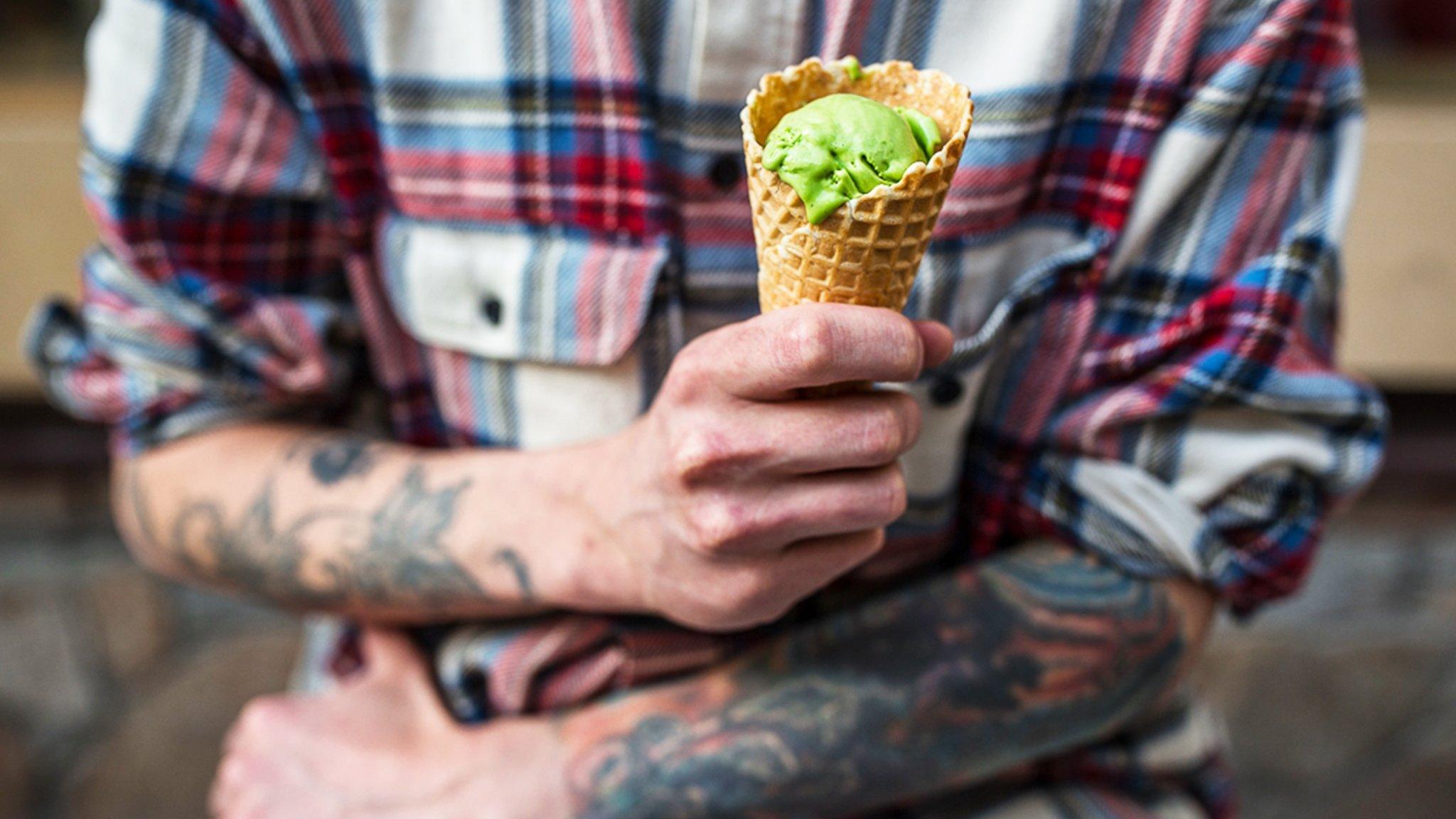

As Russia enters its 20th year under the authoritarian leadership of Vladimir Putin, St Petersburg's vegan anarchist community thrives. Hated by the far right and out of tune with Russia's prevailing nationalist mood, the activists have created a version of what their ideal society would look like - and they're promoting this vision with delicious food. Could they be changing attitudes among other young Russians?
Once a month, the eight people who work at the Horizontal takeaway hold a meeting in which they air any grievances, discuss updates to the menu, and vote on any changes they may want to make. The front of their restaurant, a hole-in-the-wall that serves vegan burgers, hot dogs and nuggets to go, is covered with stickers promoting anti-fascism, anarchism, and other vegan outlets in the city. Their meal deal offer, something commonly called a "business lunch" in Russia, is called "the anti-business lunch".
Lately, the group has been discussing whether or not to change location - the complex they're currently based in holds shows featuring captive animals, which they believe are cruel and exploitative.
Although some of them have been working there for longer than others, all eight members of the team have an equal say within the business. There are no managers and no hierarchies. Varya, 26, has been at the restaurant the longest.
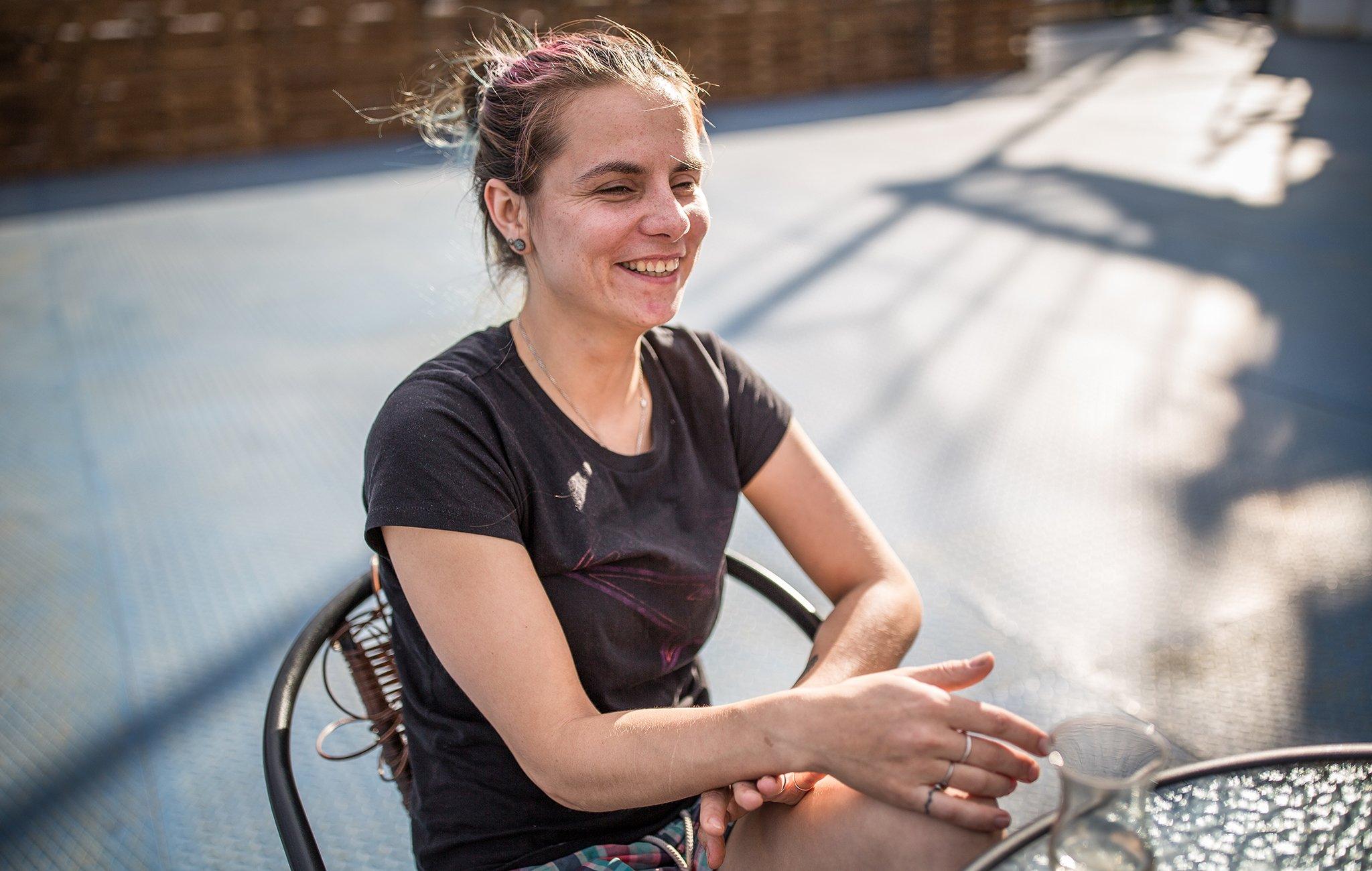
Varya, from Horizontal, says the restaurant is based on social justice and equality
"That's why we're called Horizontal - because every person who joins our restaurant is on the same level, and has the same rights and an equal position with all of the others," she says. The restaurant adheres to the principles of anti-racism, feminism, LGBTQ+ rights, the abolition of borders, and animal liberation. In a country where people who are gender non-confirming or trans are shunned, and even sometimes attacked, Horizontal is a space where anyone's preferred pronouns will be respected.
The group is planning to compose a manifesto of sorts stating what its values are, to make sure any new starters are on the same page. "For us, it's important that people who join us hold similar ideology, that they share our views, and that they understand what 'veganism' really means to us," Varya says.
Horizontal is one of about a dozen similar spaces across St Petersburg, promoting vegan anarchism - "veganarchism" - by cooking up delicious vegan food.
'You are a microcosm of the world around you'
The term "veganarchist" was coined by the New York-based anarchist Brian Dominick in his 1997 essay, Animal Liberation and Social Revolution. In it, he writes that veganism is inherently intertwined with anti-fascism, human rights activism and anti-capitalism.
The animal slaughter that vegans and vegetarians are consciously opting out of, he says, relies on systematic exploitation of both humans and animals - and that only by fighting all injustices together can a vegan truly fight against any of them.
This fight, he suggests, can be waged through individual actions and radical lifestyle changes.
"The role of the revolutionist is simple," Dominick writes. "Make your life into a miniature model of the alternative, revolutionary society you envision. You are a microcosm of the world around you, and even the most basic among your actions affect the social context of which you are a part. Make those effects positive and radical in their nature."
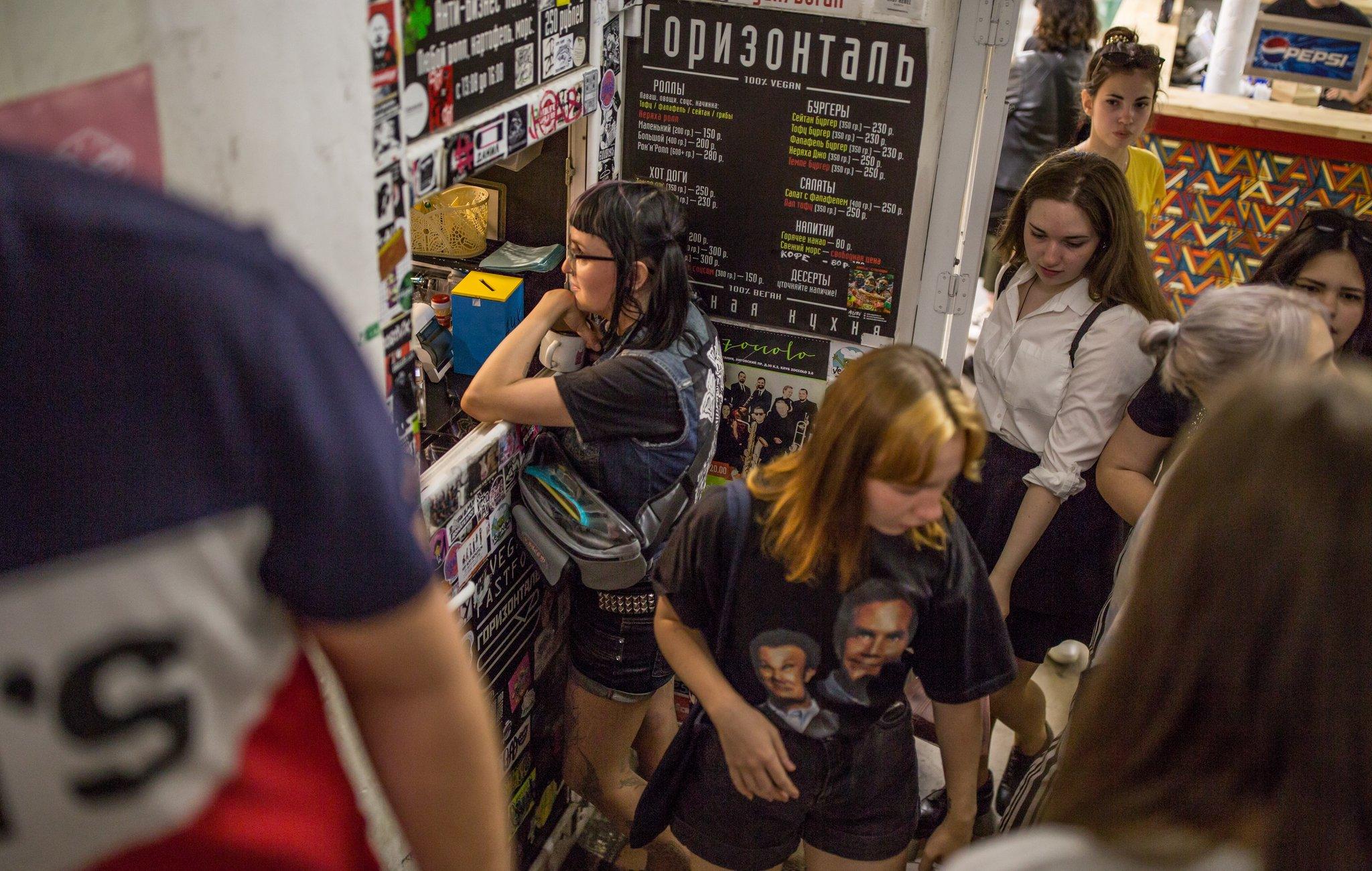

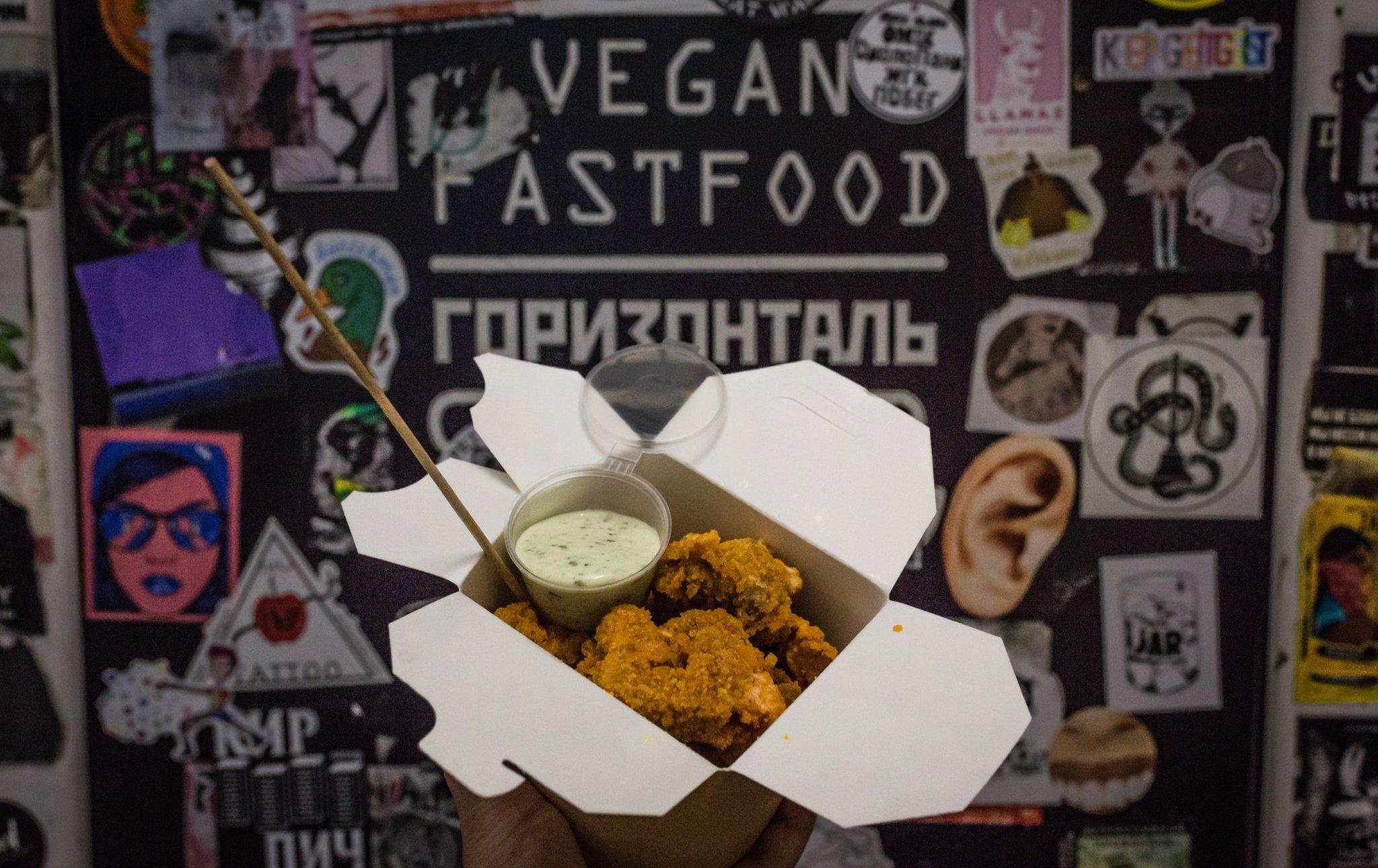
Horizontal's "chick-un" nuggets are made of a mix of tofu and seitan
But although the word "veganarchism" came from the US in the late 20th Century, both anarchism and meat-free diets have a long history in Russia.
The Russian Orthodox church prescribes a plant-based diet during Lent, and most traditional restaurants still offer a plant-based "Lenten menu". Ethical vegetarianism, meanwhile, was thriving in pre-revolutionary Russia - partly because of the example set by the novelist Leo Tolstoy in the late 19th Century.
But for much of the Soviet period vegetarianism fell out of favour, seen as a bourgeois indulgence. The Great Soviet Encyclopaedia went as far as to proclaim that "vegetarianism, which is based on false hypotheses and ideas, does not have followers in the Soviet Union".
Today, only 1% of Russians say they are vegetarian, according to a Vtsiom poll from 2018, external - roughly the proportion of British people who are vegan, external.
As for anarchism, the 19th Century Russian philosophers Mikhail Bakunin and Peter Kropotkin are considered two of the most influential thinkers in anarchist history.
Kropotkin's radical 1892 text, The Conquest of Bread, continues to influence anarchists around the world to this day. In it, he says - among other things - that one of the first steps in any anarchist revolution would be for the people to seize food and the means of producing it.
"We have the temerity to declare that all have a right to bread, that there is bread enough for all, and that with this watchword of 'Bread for All' the revolution will triumph."

Visitors to Llamas vegan grocery shop are greeted with a painting of a cow holding up two middle fingers.
Inside, rainbow-flag tote bags, feminist stickers and vegan condoms are sold alongside plant-based Napoleon cakes and reusable straws. In the freezer, there are varenyky and pel'meni dumplings made by She's Got A Knife, a "feminist horizontalist culinary project". In a back room, there's an unassuming hole-in-the-wall restaurant called Tempeh Time. It's dedicated to serving dishes made with tempeh - pronounced "tem-pay" - a protein made from fermented soya beans.
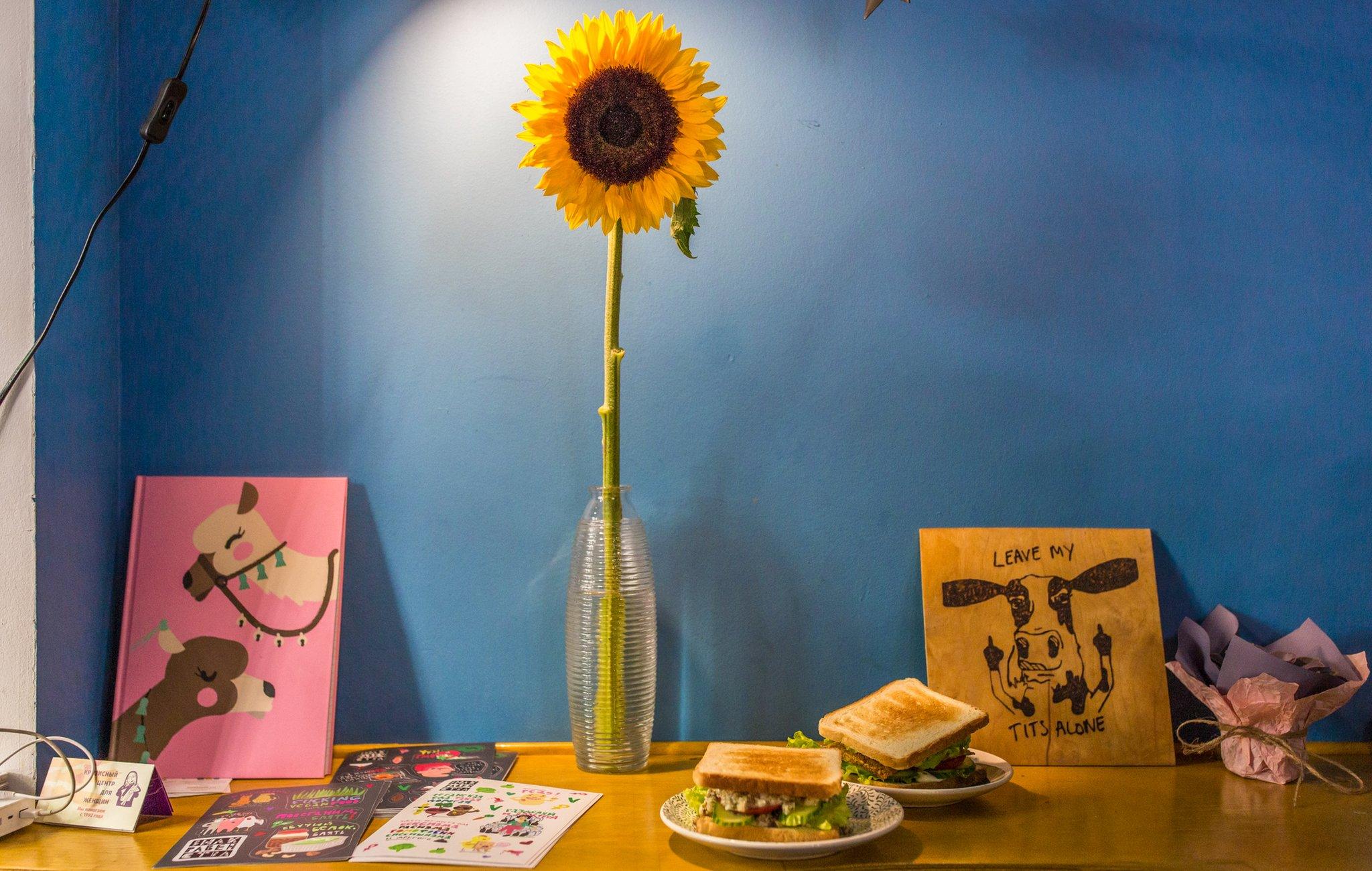
The tongue-in-cheek artwork is one of the first things visitors see
Llamas was opened last year by Anya, 30, and Igor, 33 - whom Anya describes affectionately as her "husband and best friend". When I speak to them, they're about to celebrate the shop's first anniversary.
Igor tells me that with veganism growing more popular in the city, they wanted to try and emulate similar spaces in cities like Berlin. At the time they hadn't been there, but they knew it was Europe's vegan activist capital.
"People come here for that feeling of Europe, of freedom, to feel for a couple of minutes like they're in Berlin or somewhere," he says. "We're trying to create a space where vegans won't feel ashamed to come with their non-vegan friends, and they can say, 'That's a vegan place - it's not strange, it's not scary.'"
"We didn't just want Llamas to be a shop, but also a cafe and a meeting point for our community," Anya adds. "We also had the idea to open a barbershop nearby, but that's still just an idea."
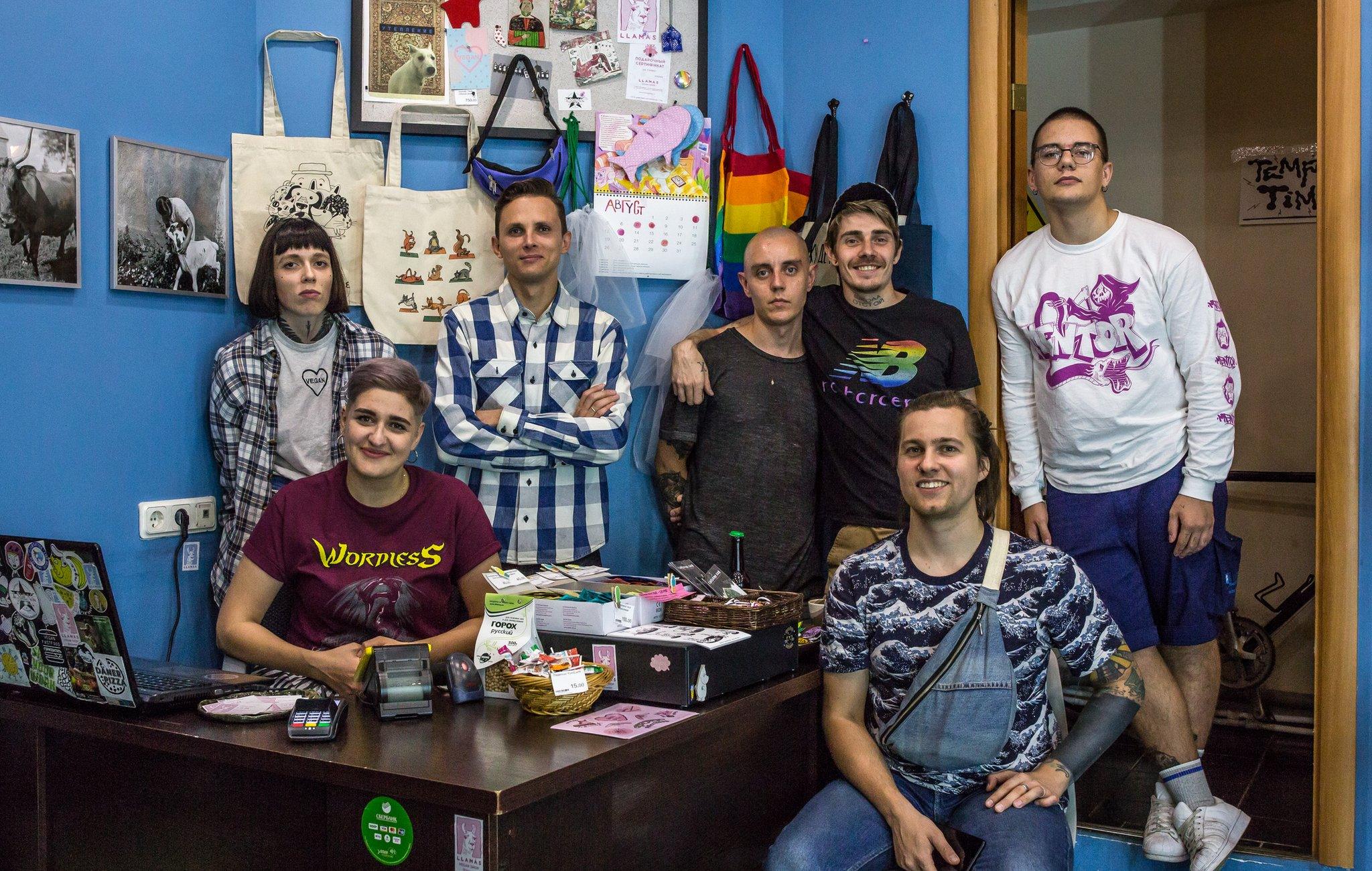
Anya, front-left, and Igor just behind her, are joined at the shop by Iiuri, front-right, and the kitchen's previous resident Danya, behind him
Opening up their back room to vegan chefs was a big part of building this community space and putting their beliefs into practice, Anya says. The kitchen's first occupant was Danya, a friend of Anya and Igor's, who ran a pizzeria called Daner Pizza. When he moved out into a larger space, Iiuri Shilov, a tempeh maker, moved in. He had a soft launch of his restaurant Tempeh Time in early August, before officially opening on 7 September.
'Food can be its own form of activism'
I order a large bowl of fried rice, tempeh and fresh cucumber for 180 rubles - £2.26. The other options on the menu, including sandwiches and soups, all hover around the 200 ruble mark. Iiuri explains that he wants to keep prices low in order to make vegan food - in particular, tempeh - accessible to as many people as possible.
"My mission is for more and more people to try tempeh," he says, beaming.
Iiuri first ate it two years ago while he and his wife were travelling across south-east Asia for their honeymoon. It was in Indonesia that he ordered a tempeh dish and, he says, it blew his mind. It had a flavour that was both mushroom-like and nutty, with a firm texture a bit like chicken. When fried in oil, with a small sprinkling of sea salt, the flavour was like nothing else he'd ever eaten.
It rapidly became an obsession. Every day, after surfing, he would go back to the same cafe and order exactly the same dish that he had eaten that first time, and that I had coincidentally just ordered for myself: fried rice, tempeh and cucumber.
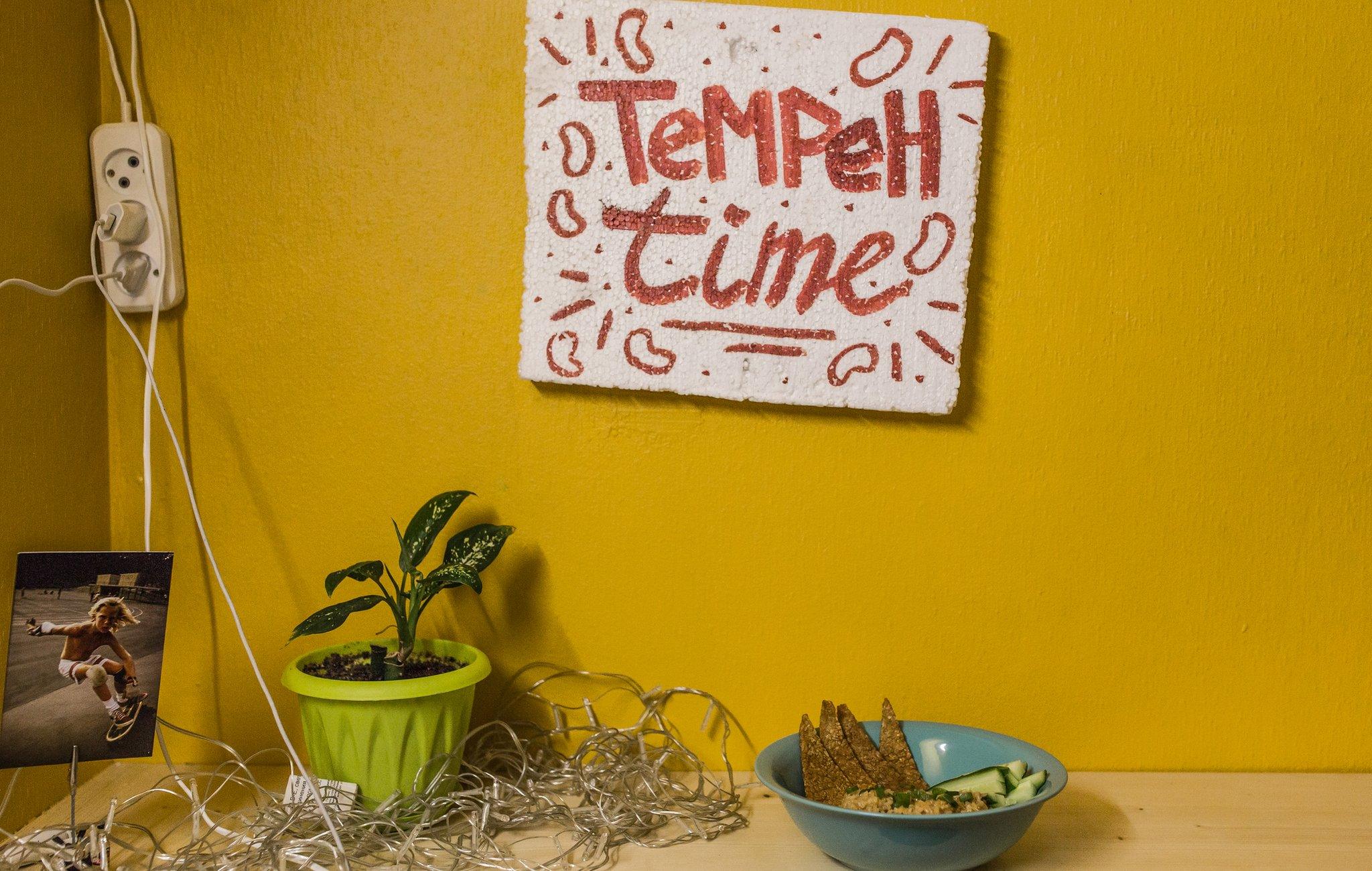
Iiuri first discovered tempeh while on his honeymoon in Indonesia
But when the honeymoon was over and the newlyweds were back home, Iiuri couldn't find his new favourite food anywhere.
"When we came back to Russia, I wanted to eat tempeh. I kept looking around for a tempeh shop, or maybe even a tempeh cafe, but I couldn't find anything," Iiuri says.
So he decided to make it himself.
"I looked online and found an American book on tempeh production. It was old - a man called William Shurtleff had written it in the 1970s - but it was perfect," he says.
"After reading through the book, I ordered the starter [an ingredient for fermenting] all the way from Indonesia, made my own incubator at home, and bought enough soya beans to make about five or six packs of tempeh. At first I just made tempeh for myself and my friends. Then, once I figured out how to make bigger batches, I started selling to places like this," he says, gesturing to the grocery shop, Llamas, in which we are sitting.
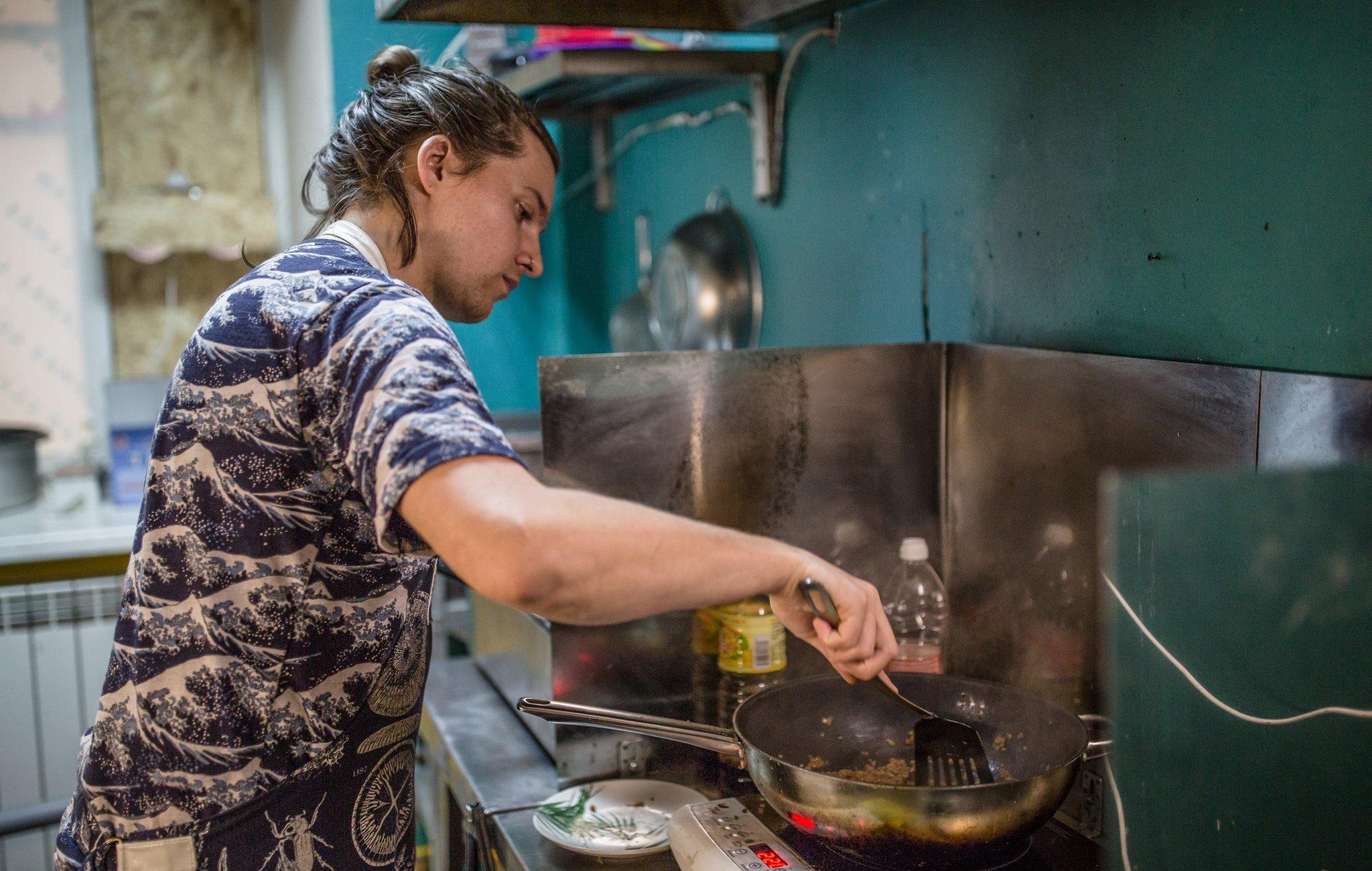
He cooks me the same dish he had while he was in Indonesia - fried rice, tempeh, and slices of fresh cucumber
Before long he was making about 10kg of tempeh per batch, with a hands-on process that would have him up in the early hours of the morning. "My wife started getting fed up… At this point we had a three-month-old son. Imagine: my baby is crying, my wife is getting annoyed, and I'm there making tempeh at 2am."
Eventually his wife lost patience. "Iiura, go and find a proper kitchen," she told him. This turned out to be great advice, because once he did - it was a room lent to him by a friend of Danya the pizza-maker - he was able to make more tempeh than ever.
Outside Indonesia, tempeh is far less common than other vegan proteins, such as tofu and seitan, a meat substitute made from wheat gluten. Personally, I had never been a fan - but Iiuri's tempeh was delicious, unlike anything I'd ever tried before.
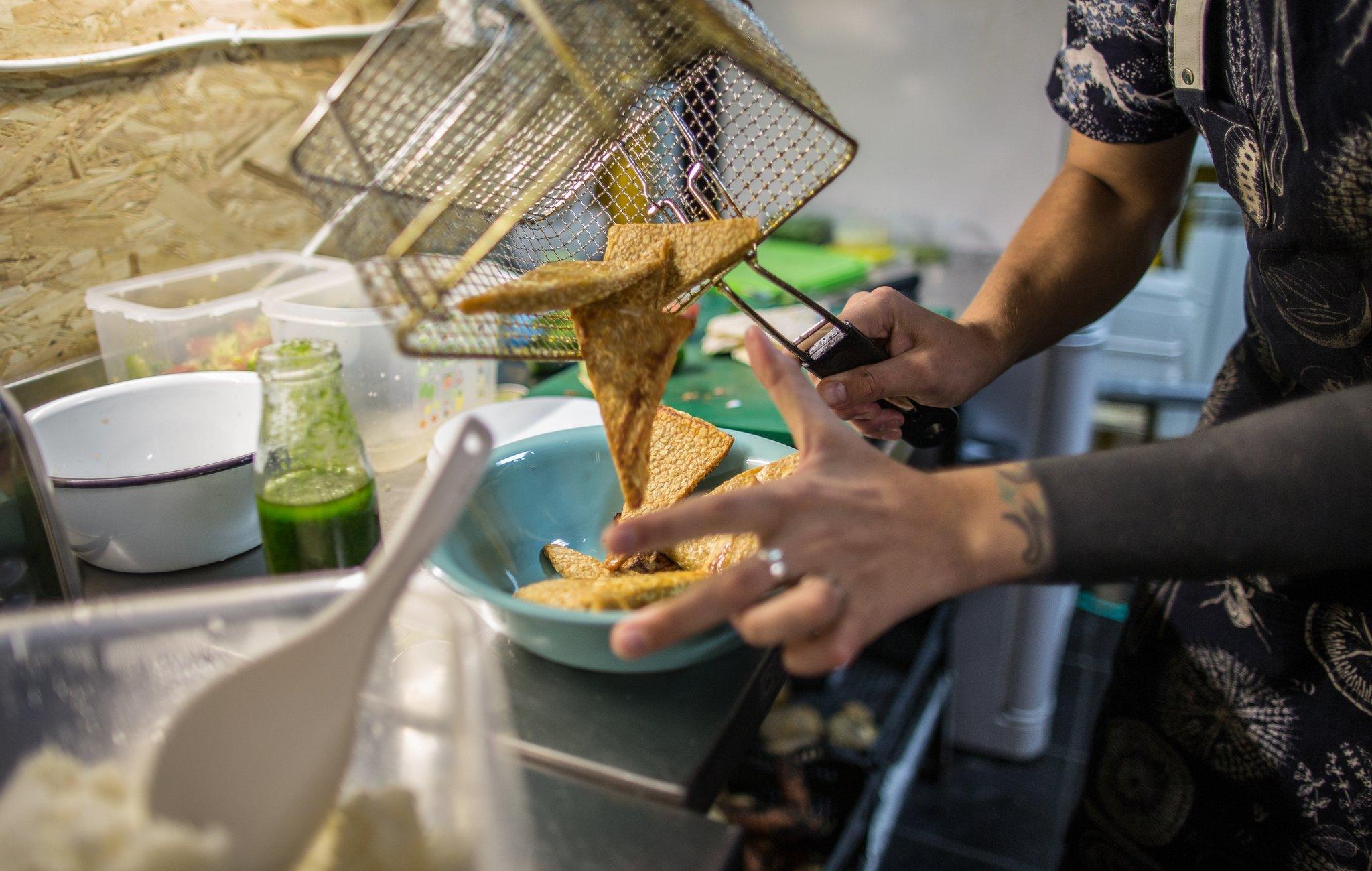
He doesn't add any special sauces to the tempeh, he just fries it with oil and a bit of salt...

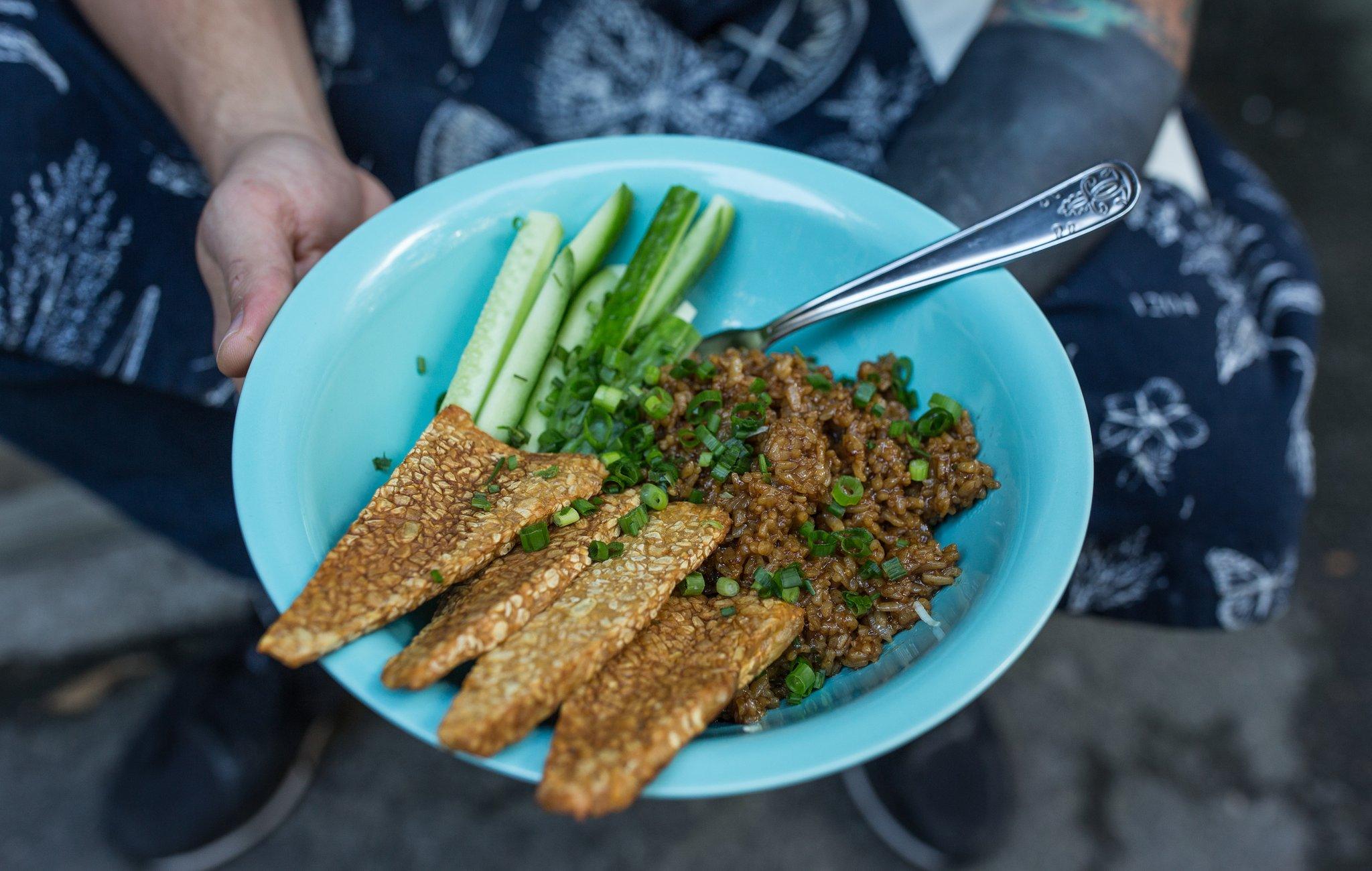
Before serving it with rice and cucumber, garnished with spring onions
Iiuri tells me he went vegan six years ago, when he was working in the kitchen of a bar. He made himself a fried-egg sandwich, and a colleague asked him, "Iiuri, why do you eat eggs?" before using some choice words about the meat, dairy and egg industries. Intrigued, Iiuri watched an Austrian documentary about veganism.
"It was super-disgusting," he says. "What I saw... it made my soul hurt. I felt so bad about all the time I had spent eating meat and eggs, and drinking milk."
Now, he tries to spread a positive message about veganism through his cooking.
"Food can be its own form of activism," Iiuri tells me. "I have customers who eat meat, but after trying tempeh they enjoy it just as much. Many of my friends have tried tempeh and liked it too - I have one friend who's non-vegetarian, but after eating tempeh he's realised that he doesn't really need meat.
"Now, he has at least one meat-free day a week. This is action."
'It's possible to change the world one person at a time'
While Iiuri provides simple, hearty vegan food at low prices, another young vegan chef, 25-year-old Viktoria Mosina, is applying her vegan beliefs to haute-cuisine at her restaurant, Grun, and making vegan versions of traditional Georgian food at a nearby cafe, Dze Bistro.
When we meet, Viktoria has just been shortlisted for a St Petersburg culinary award - the only woman in the Best Chef category, and the only vegan among the 31 contenders. For Dze Bistro, she devised a menu of plant-based Adzharuli - a type of Georgian bread, usually filled with meat. Viktoria's versions, however, are made with plant-based ingredients - aubergine and pomegranate, for example, which are traditional in Georgian cooking.
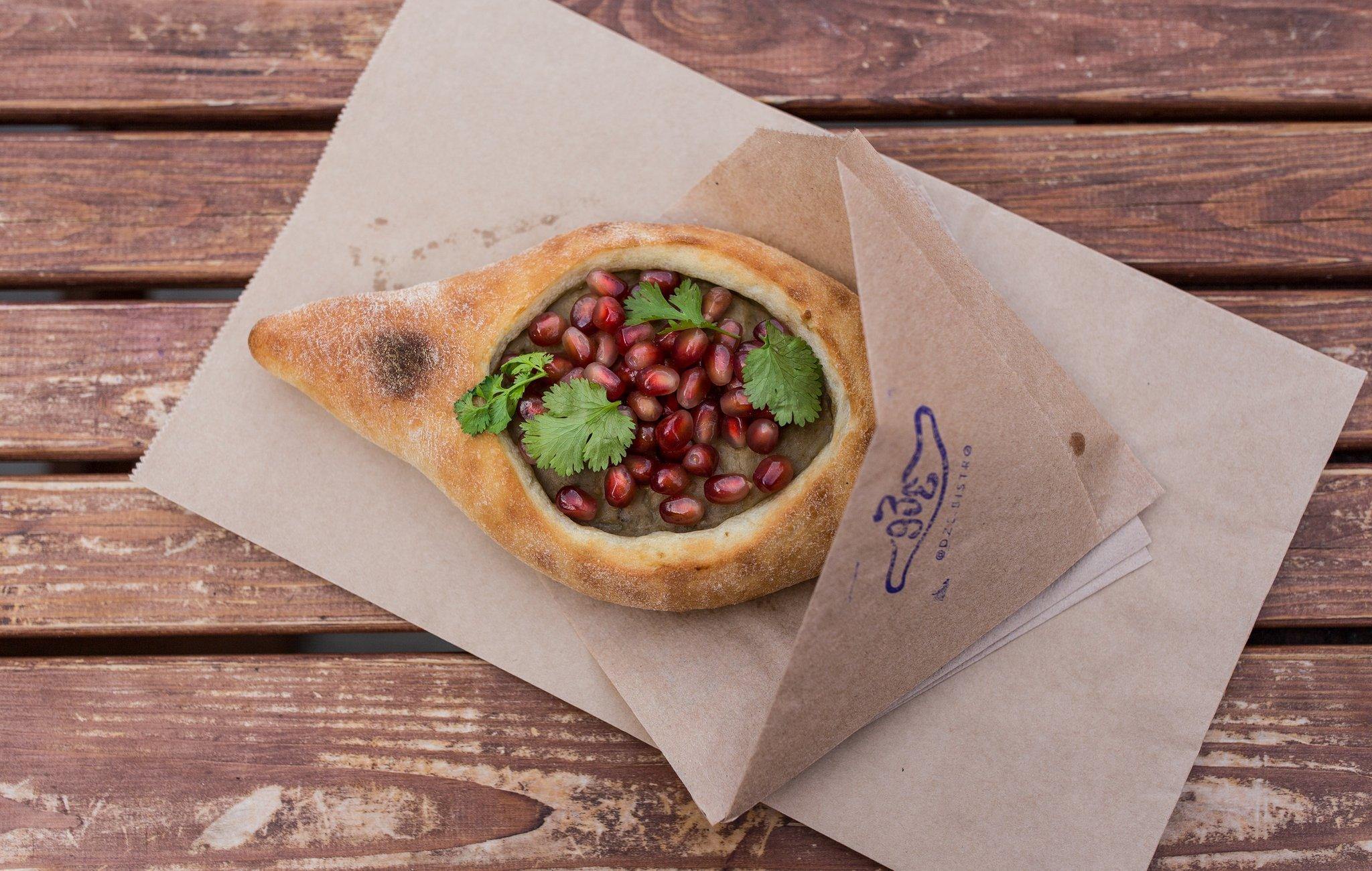
A pomegranate and aubergine adzharuli from Dze Bistro, which serves vegan Georgian food

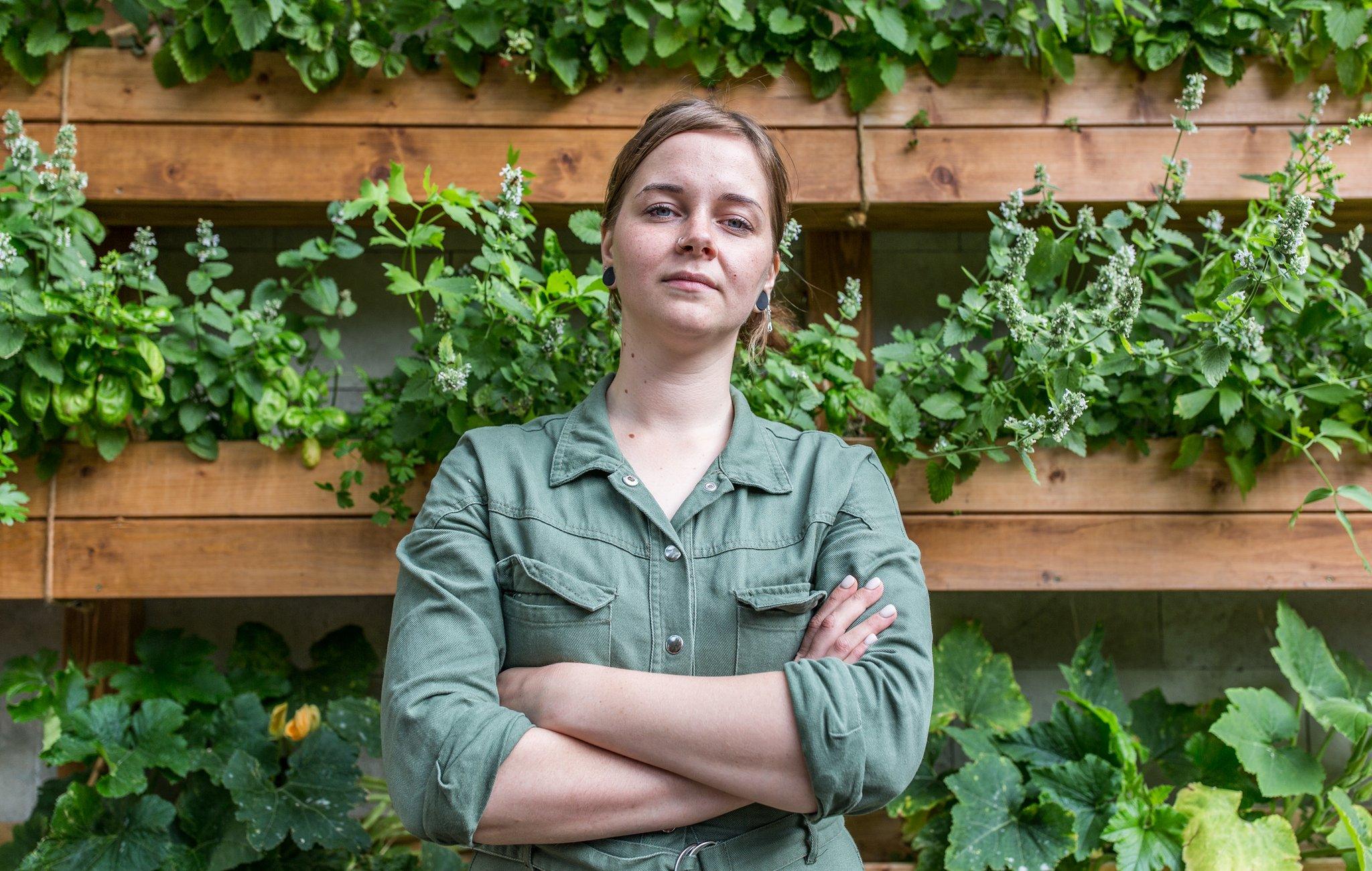
As well as going into the forest, Viktoria grows her own herbs and vegetables in an allotment attached to the side of the restaurant
As we speak, she shows me two deconstructed versions of traditional Russian soups from the Grun menu - one nettle soup and one svekol'nik, a type of beetroot soup.
"I started to cook when I was 16, and ever since then my focus has been on promoting veganism and making it popular," she says. "After a while I started to realise I could try to change the world through food - and now I've learned to cook food from plants that is so good, people won't have any need for meat."
There were so few vegan eateries in St Petersburg when she first started cooking that there was nowhere for her to learn about the restaurant business. So she started her career in non-vegan kitchens, cooking only their vegan options - although she insisted that they weren't marked as vegan as on the menu.
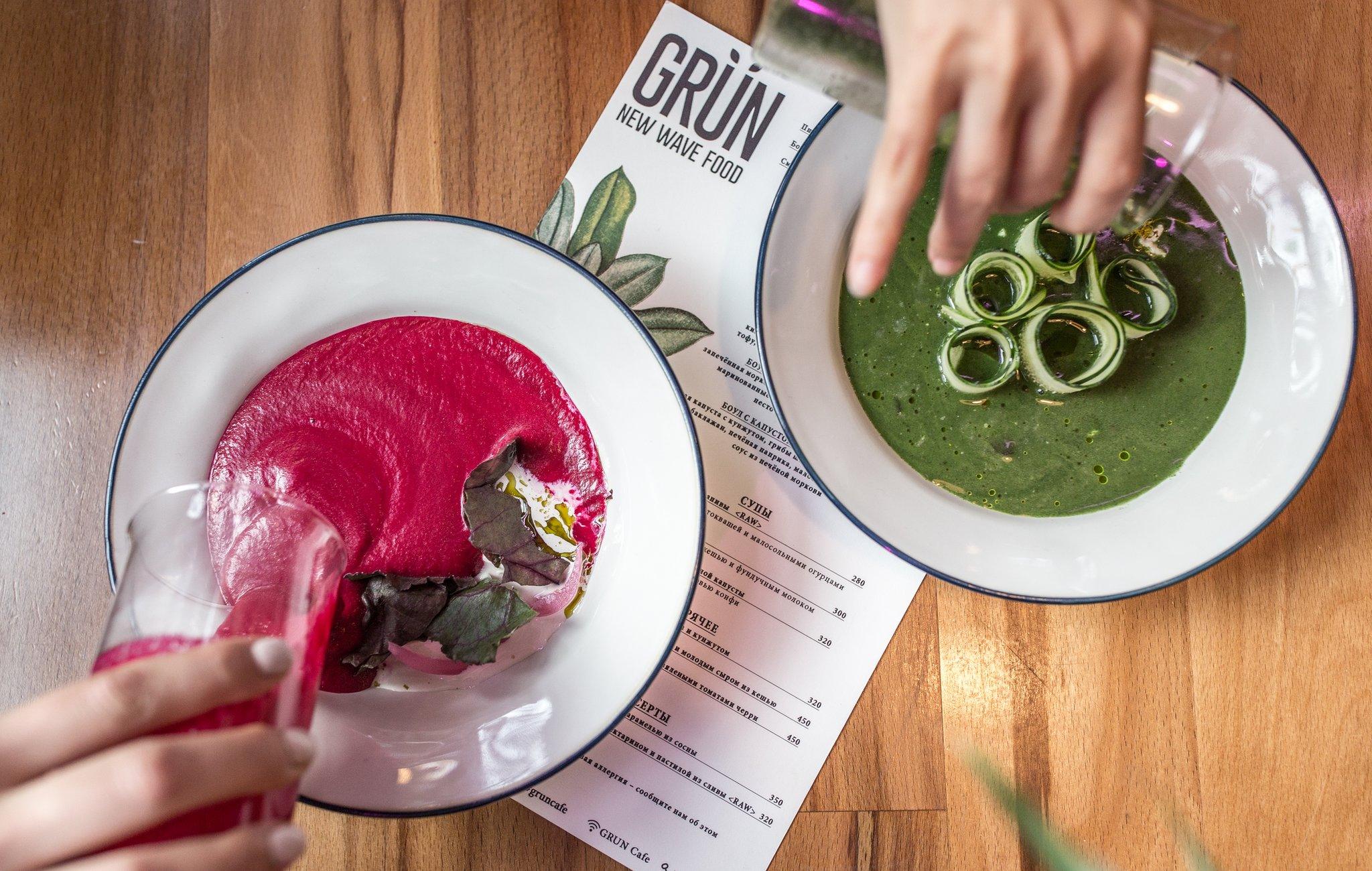
Viktoria and her colleague pour vegan svekol'nik, left, and nettle soup, right, into bowls
"In Russia, if a person knows that something is vegan, they'll refuse it on principle because they have stereotypes in their mind," she explains.
When she then told her non-vegan customers what they had just eaten, they would often be surprised to learn that it hadn't been made with meat or dairy.
"At that moment, all those stereotypes would fall away. Because of my efforts and my mainstream popularity, vegans are not seen as grass-eaters or cultists as much as they used to be," she says.
Viktoria's focus is on using fresh, seasonal plant ingredients that she either grows in a wall-mounted allotment attached to the restaurant, or that she picks herself in the wild. Once a week she goes to the forest with her kitchen team, sees which plants she can find, and researches them in botanical textbooks to figure out the best way to cook with them. When she returns to the city she spends about a day or two developing new recipes, and by the following week they are on the menu.
"It's possible to change the world one person at a time. That's the form my activism takes - to change individuals," she says.
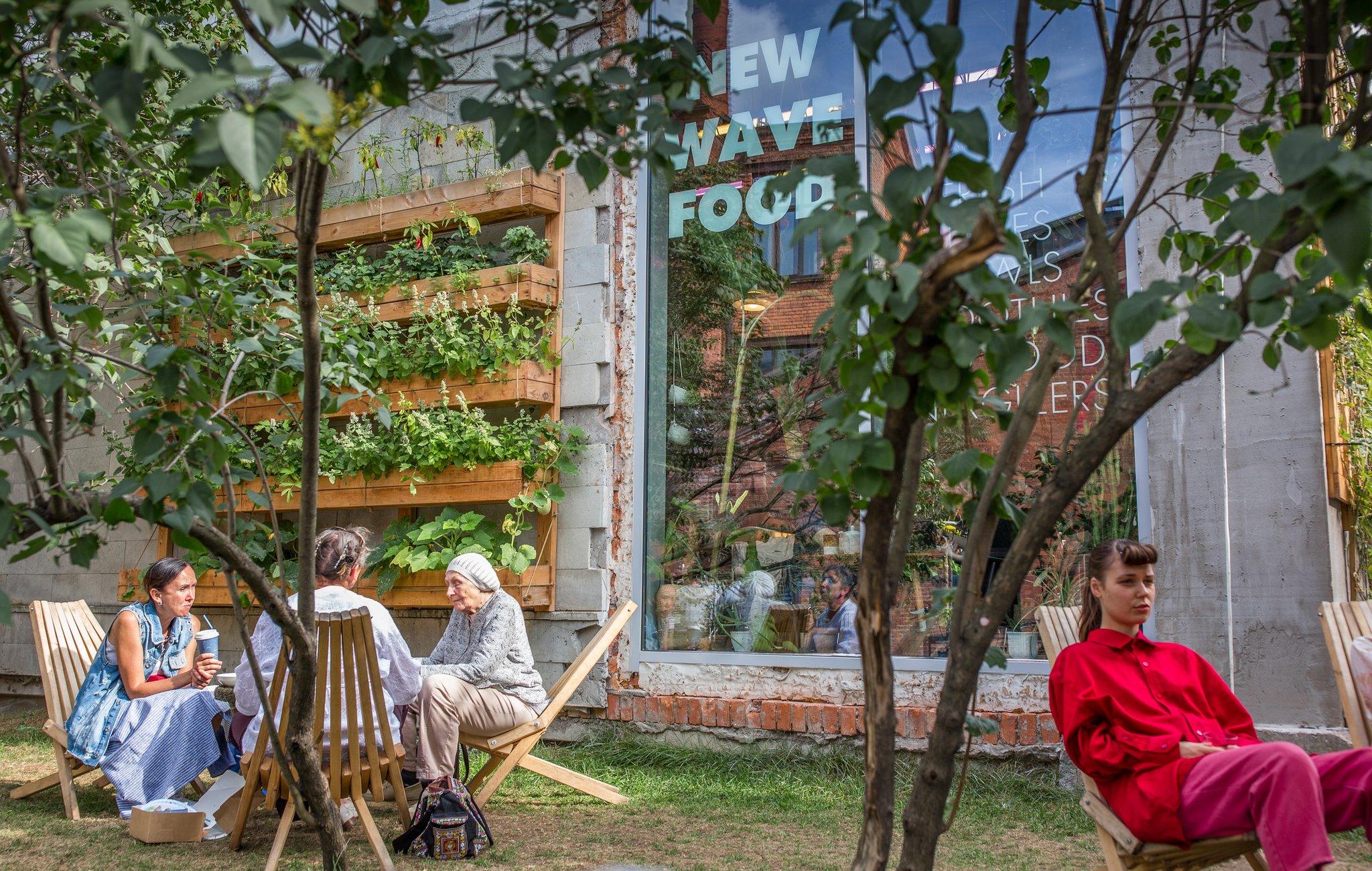
Viktoria focuses on fresh, wild ingredients at Grun, which opened this February
Sonia, 26, feels the same way. She runs a cake business called Run Rabbit Run, which she founded just over three years ago with another vegan baker called Slava, 31. After a while they parted ways amicably, and he opened his own cafe.
As well as running the bakery, Sonia is also making a name for herself as a feminist YouTuber, vlogging with friends on a channel called Feministki Poyasnyayut - "Feminists Explain" - in which they clarify "things about feminism for ordinary people". She has also collaborated in cooking tutorials with the popular vegan YouTuber, Mikhail Vegan.
The best way to get a message across, she says, is to "lead by example" - something she tries to do with Run Rabbit Run. "If you're an ethical vegan and you're healthy, you're OK and you're not dying - you're just as normal as anyone else but you're vegan - in my experience that really is the best form of activism!"
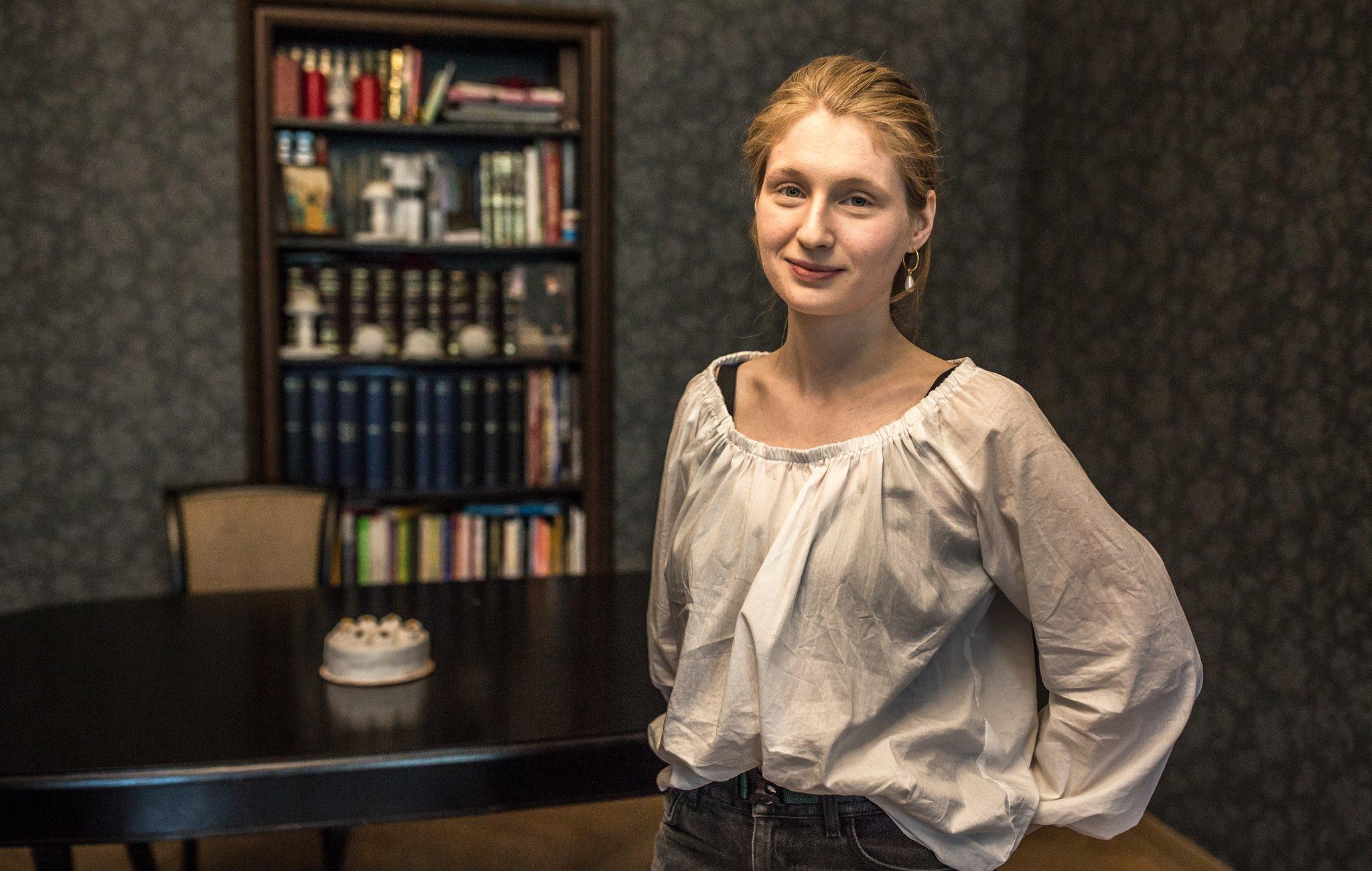
Sonia is one half of a feminist YouTube duo, called "Feminists Explain"

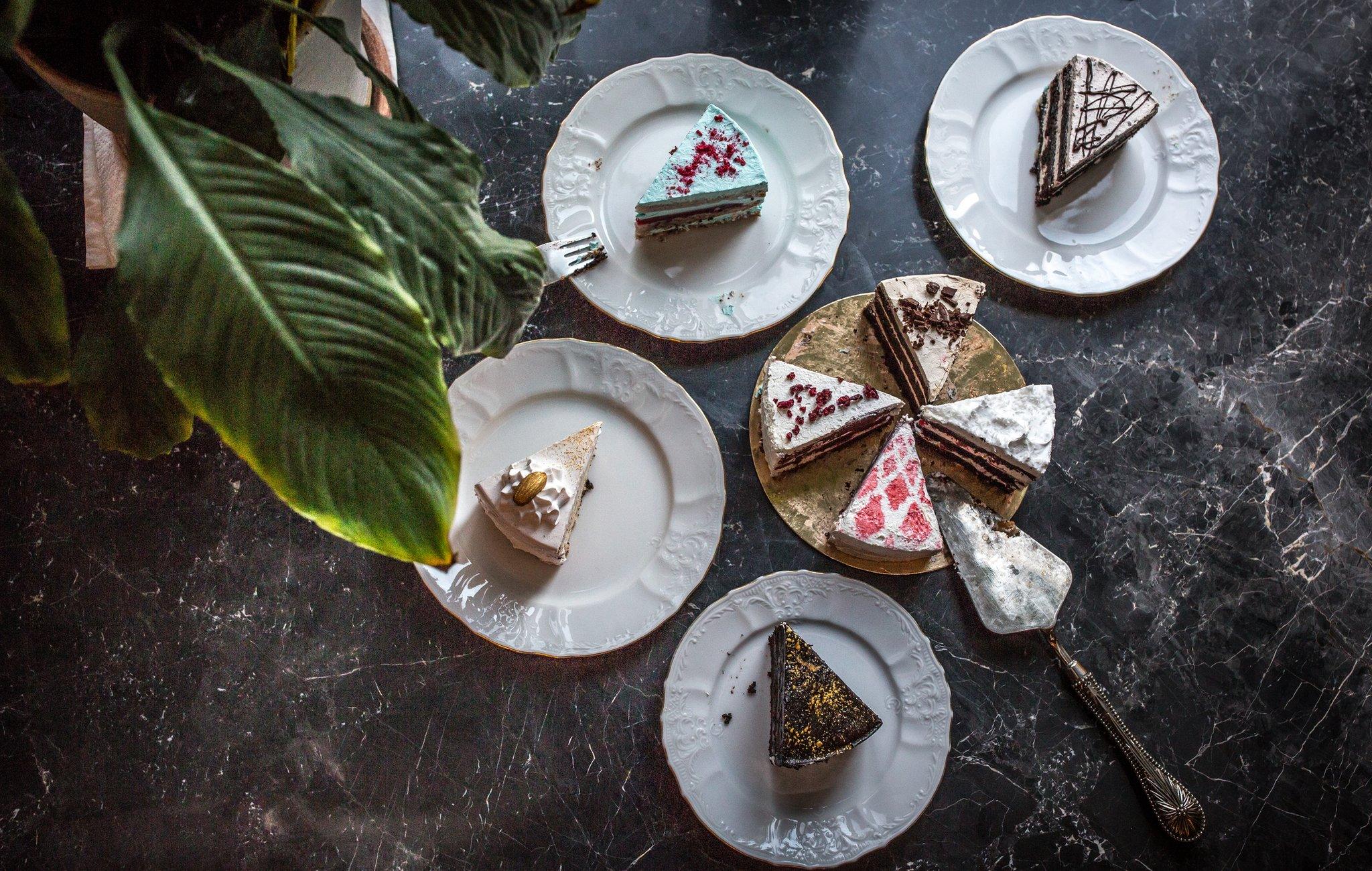
The cakes at Run Rabbit Run, she says, are supposed to be a delicious indulgence
Sonia shows me a few of her cakes, and explains why customers won't find unrefined sugar or superfoods in her recipes.
"Some people think being vegan is somehow automatically healthier," she says. "I don't think so. I think it can be really healthy if you want it to be, but I don't think cakes should be healthy. I think they are something you should indulge in and enjoy. They are sugary, they're fatty, they have a lot of carbohydrates - they're not healthy at all."
Meanwhile, the cafe started earlier this year by Slava, Sonia's former business partner, is thriving too. He tells me he's inspired by Scandinavian culture, which is why he decided to name it Fika, the Swedish word for their afternoon tea.
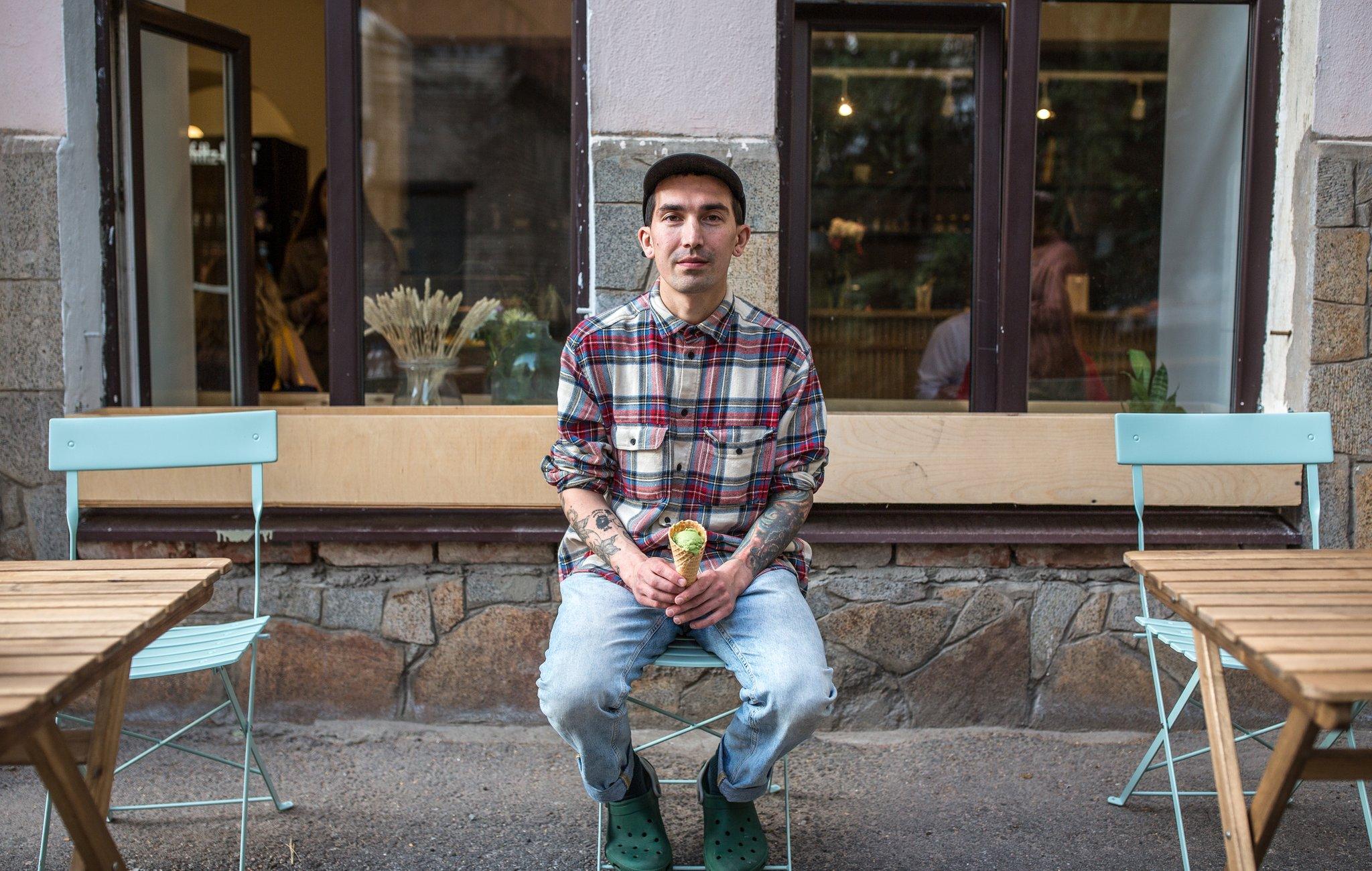
Slava, holding a matcha-flavoured ice cream, was inspired by Scandinavian culture when he opened Fika

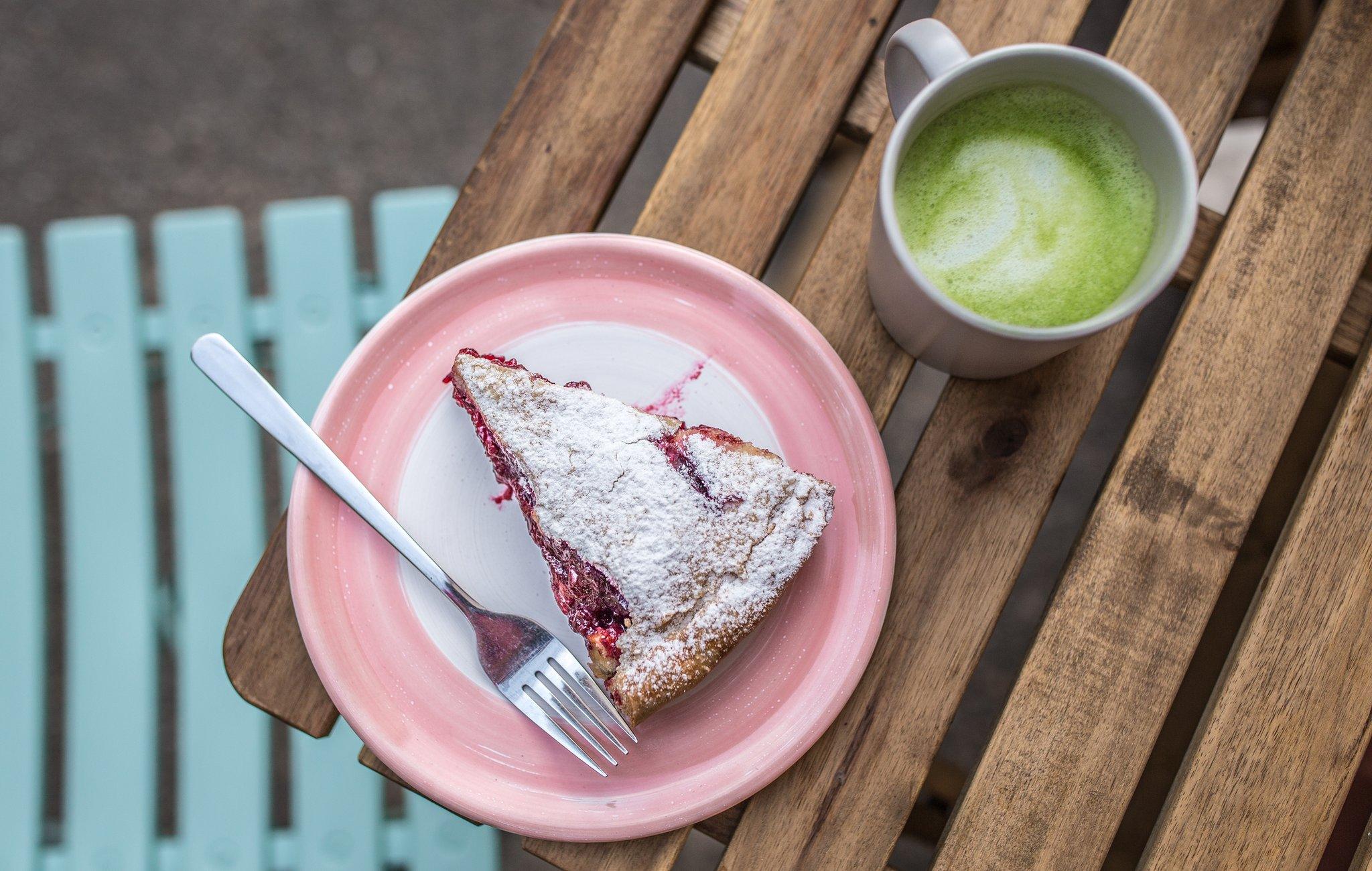
Before we talk, he brings out a cherry pie and a matcha latte
"I really liked the concept of a salad bar, deli and bakery with a cafe - I've seen similar things in Scandinavia and Finland," he says. He used to have a cafe near the Fontanka river, but it was small space, and the food was so popular that there were almost always long queues. In his new location - which is less central, but more spacious - it is much easier to get served.

When St Petersburg's vegans say their philosophy is about more than food, it's not just empty words.
A week before I met them, Anya and Igor from Llamas had taken part in an annual festival in the city called Znak Ravenstva - meaning Equal Sign. It promotes not only veganism, but also feminism, anti-racism, LGBTQ+ rights and environmentalism, and tries to show how all of these movements are connected - as Brian Dominick himself believed.
As well as food stalls, there are lectures, workshops on blogging and zero-waste living, and bands performing live.
One of the festival's six co-organisers, Kostya, 24, tells me that Znak Ravenstva is now in its second year. Its predecessor, Vegan Fest, which focused more exclusively on veganism, ran for four years before the organisers decided to widen the scope.
"We're trying to say that everything is connected, and if you're vegan you have to also support all other movements for equality - so feminists, for example, are coming and learning about veganism, and vice-versa," Kostya says. But making this change hasn't been easy.
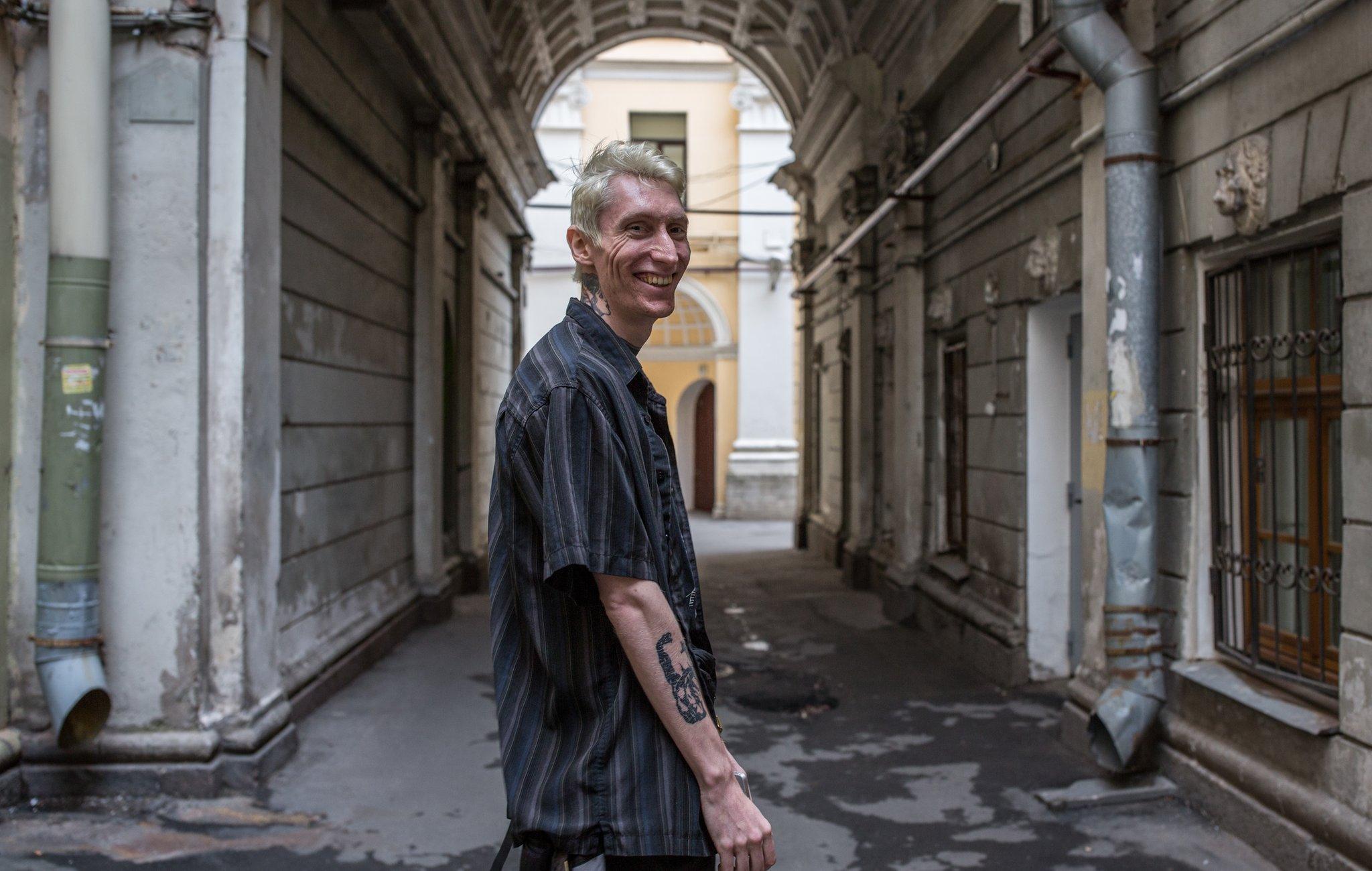
Kostya is one of six co-organisers of Znak Ravenstva - "Equal Sign"
"Unfortunately, when we started including feminism and LGBT rights, the number of participants went down - because of prejudice." He named a couple of restaurants that had pulled out of the festival because some staff members didn't want to openly support these causes.
But the festival's popularity is growing nonetheless, he says. This year they had about 5,000 visitors.
For Anya and Igor, events like Znak Ravenstva are vital both for helping to broaden their community, and for promoting equal rights in the city more widely.
"These four days of the festival felt even better than our last New Year holiday, because of the atmosphere, the feeling of freedom, the kindness, the tolerance… it was like a vision of our ideal Russia," Anya says. "It is very hard for us as vegans to be open, but here we could come and see different projects, meet new people and make friends."
Igor agrees, and adds that because vegans don't get much support from outside the community, spaces where they can be themselves are really important.
"The fact that this festival even happens, it's quite strange in itself," he says. "This vegan festival, promoting tolerance and equality, is against the main ideology of our society."
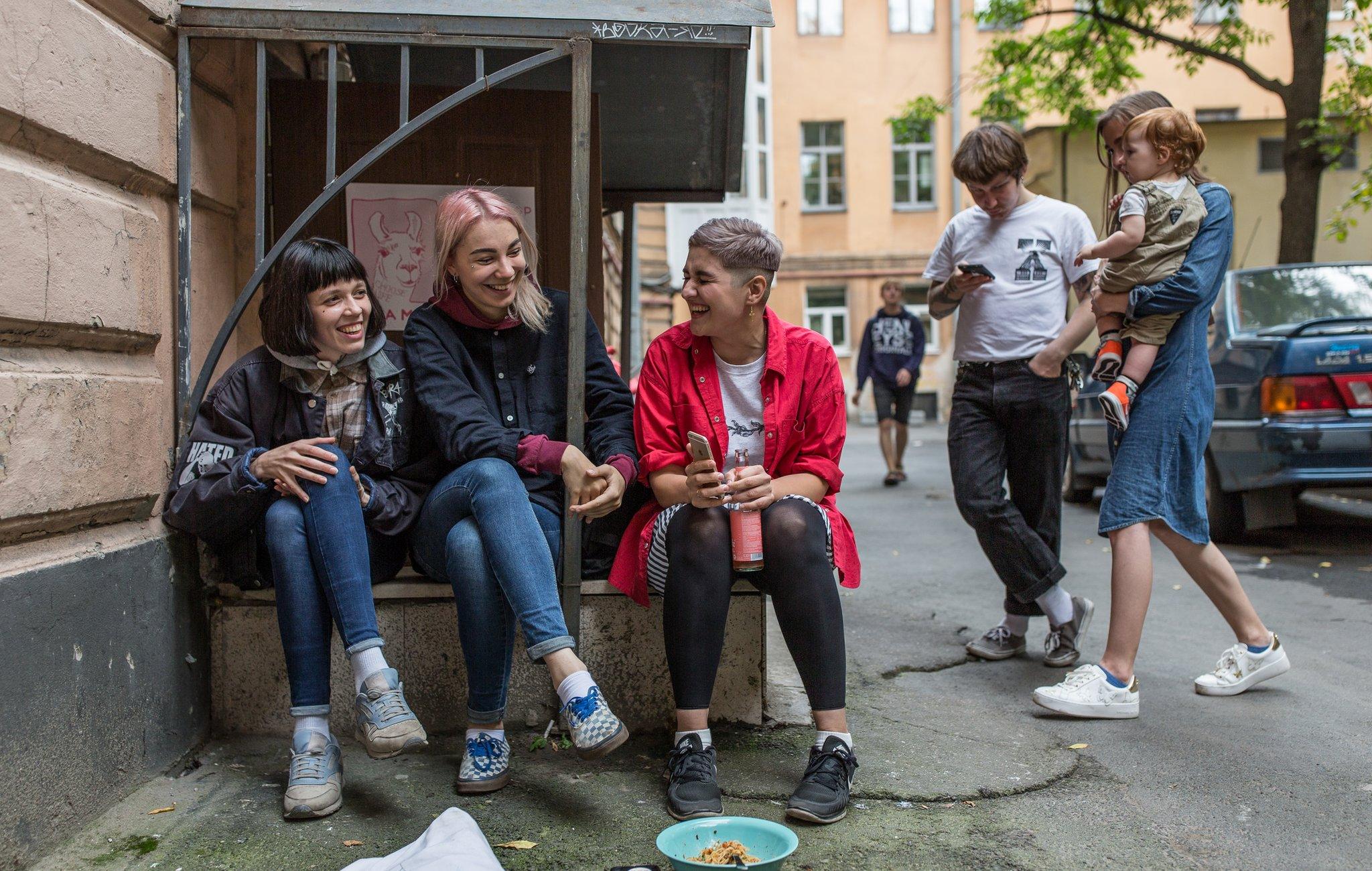
Anya, pictured with friends at Llamas, and her husband Igor say spaces like Znak Ravenstva are vital for their community
On the other hand, St Petersburg has a long-established tradition of activism. This goes back to the Soviet era, and it's why Kostya says this may be the best city in Russia to be vegan - and to be an activist generally. It's also why he moved to St Petersburg from his hometown in Russia's far north.
There's a feminist cafe called Simona, for example (named after Simone de Beauvoir) which made headlines in March when a group of pro-Kremlin men barged in armed with flowers for Women's Day. A confrontation ensued and one of the intruders ended up being pepper-sprayed.
Elsewhere, there is a community centre called Open Space for activists to use, free of charge - a simple concept, but a rarity in many cities globally.
Open Space's co-founder, Ilya, tells me that it is home to the city's only feminist library which, when I visit, is decorated with feminist anti-fascist posters and flyers calling for the release of political prisoners. It also regularly hosts events for independent electoral observers - a risky vocation in Russia - and marginalised groups, including the LGBT community, "because it's unsafe to be openly gay here". In total, he says, more than 80 independent activist groups have organised events at the space.
But if Znak Ravenstva and Open Space are microcosms of the ideal Russia for the vegan anarchist community, the real Russia is sometimes very different. It's possible to be prosecuted for the type of activism that many of them support and sometimes engage in.
Numerous Russian pride parades and LGBT youth groups have been shut down under the country's "gay propaganda" law, which bans the positive depiction of same-sex relationships in any media that can be consumed by children - including the internet. Recently, the authorities shut down two LGBT community groups on Russian-language social media. And while a growing number of young Russians seem ready to take to the streets to protest against the actions of local officials - against the exclusion of candidates in local elections, for example, against the destruction of a park, or the creation of a toxic dump close to a river - they may pay for it with arrest.
But there is one case in particular that has hit home for the veganarchists in St Petersburg.
In early November 2017, an anti-fascist vegan cafe owner called Arman Sagynbaev was arrested at his home in St Petersburg and charged with terrorism offences. He was one of about 10 activists from St Petersburg and the city of Penza, far away in the Volga region, accused by the authorities of being part of an "anarchist terrorist group" called "the network". Investigators accused them of trying to promote, through talks and meetings, "further destabilisation of the political climate in the country" during the presidential elections and the 2018 World Cup. The vegans I spoke to believe Sagynbaev is no terrorist, and that he was targeted because he was anti-fascist.
Sagynbaev initially confessed to the charges against him, but withdrew this confession in September last year, alleging - in a lengthy and detailed statement - that the FSB had extracted it by means of torture.
Two of his co-defendants have lodged complaints of torture with the European Court of Human Rights. Sagynbaev remains in custody, awaiting trial.
Sagynbaev's arrest, Igor says, felt like a warning to the rest of the community.
"The political situation in Russia prohibits us from being free as vegan activists," he says. "In Europe it's easier to be openly vegan and support equal rights, but Russian politics is the politics of xenophobia, of the absence of free speech."
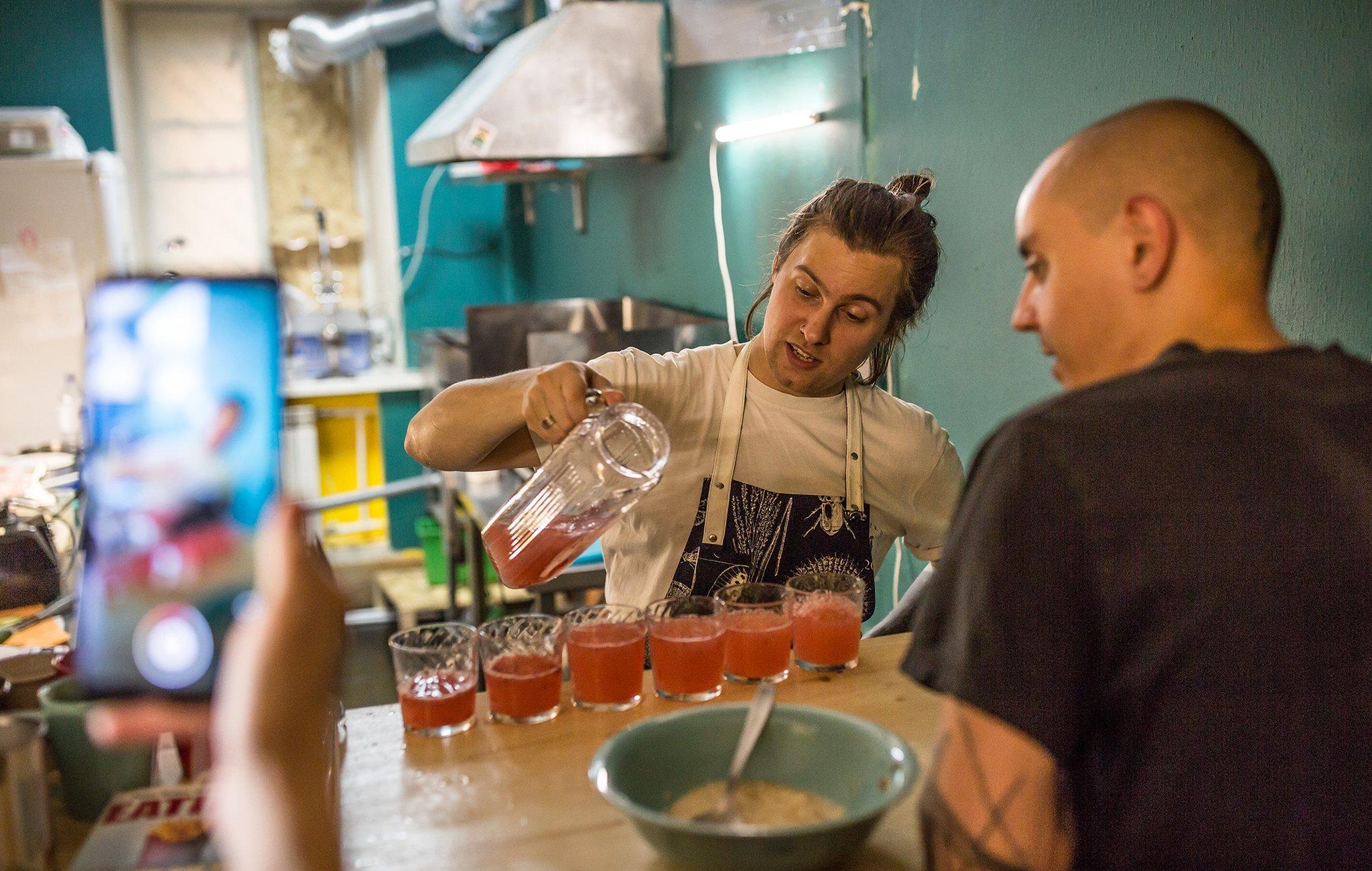
Iiuri says Russia's political situation makes him want to leave the country
When I ask Iiuri about politics, the smile quickly drains from his face.
"The political situation in Russia is worse than disgusting," he says. "I hate our president, I hate our government. Policemen beat our guys, they break their legs."
Iiuri is referring to a graphic designer in recent pro-democracy demonstrations in Moscow, who had his leg broken by officers at a time when he wasn't even protesting, just jogging past City Hall.
"Last year, my wife and I went to a protest. She was pregnant - and the police came up to us and threatened to beat her," Iiuri continues, looking visibly shaken at the memory. He tells me that he and his wife are even thinking about moving to another country, such as Canada. "I'm 31, and I've lived almost my entire life under the Putin regime. I don't want to live here any more."
'We have a problem'
But it's not just the authorities the vegan community worries about.
Several of the people I speak to describe confrontations with far-right groups. These range from neo-Nazis sticking far-right stickers on their doors, to being violently attacked - including beatings and stabbings.
In October 2017, a group of young, far-right activists went to a now-closed vegan anarchist restaurant called Animals and shot flares through the glass of the windows. Some staff were seriously injured.
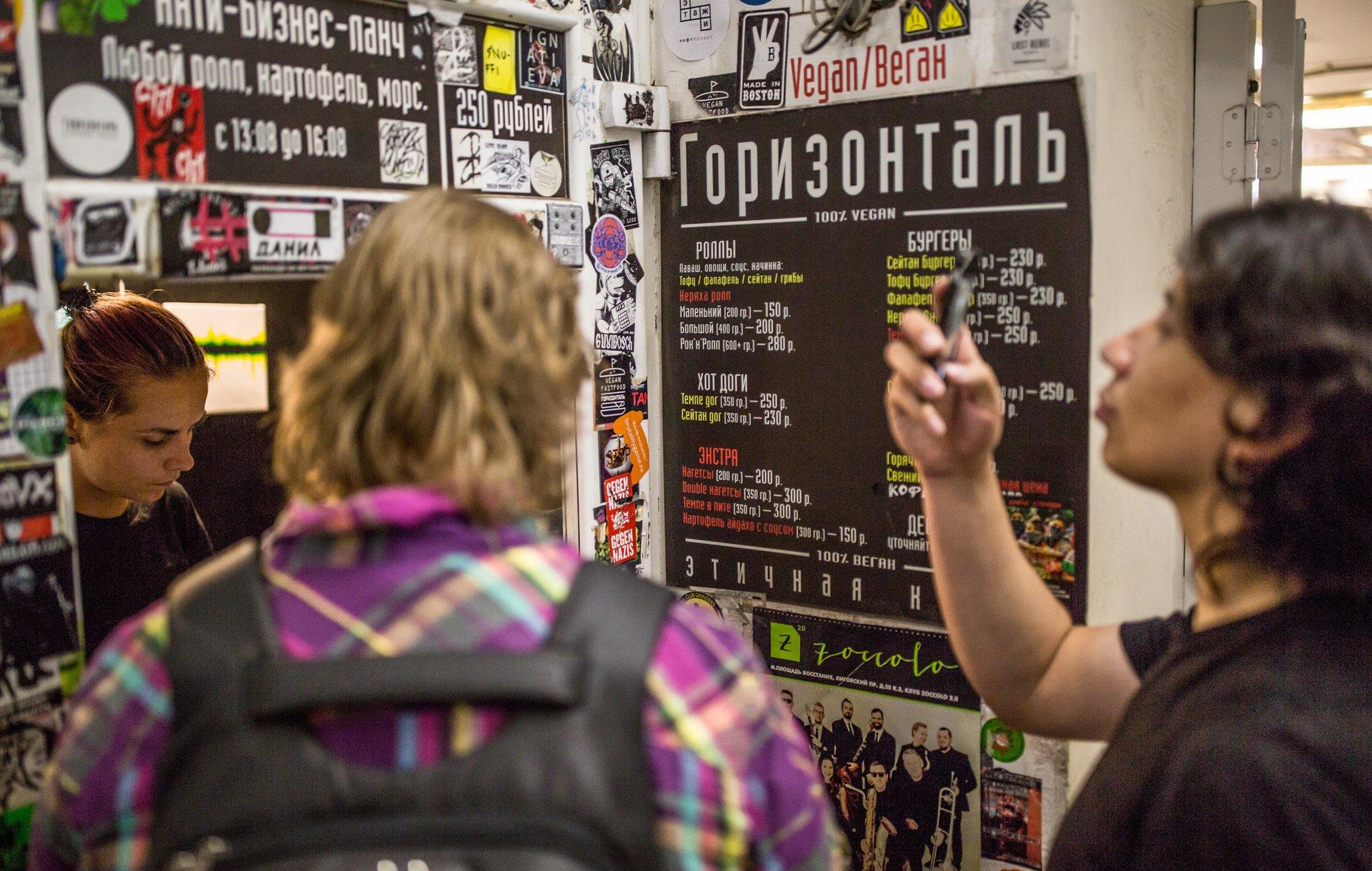
Animals, not pictured, was attacked by a far-right gang in 2017
Animals was run by the same group behind Horizontal, and was located just a few feet away. Like Horizontal it was an openly anarchist restaurant and a known meeting space for activists, says Horizontal worker Varya.
"It was the fash," she tells me, using a slang word for neo-fascists.
"We are politically active and we support different activist groups, we cover our walls with stickers, so they knew to target us. We all understand who was behind it, but no-one was fined or arrested."
Kostya tells me that he first became consciously anti-fascist at the age of 15, growing up in a village in the far-northern Yamalo Nenets district. It was a multicultural area - including members of the indigenous Nenets ethnic group - but there was also a strong far-right, Russian nationalist movement. This disturbed Kostya, who believed that everyone was equal.
Even earlier, when Kostya was 10, he had been shocked by the murder of a 20-year-old rock musician and anti-racist activist, Timur Kacharava, who was stabbed to death by neo-Nazis outside a bookshop in St Petersburg. It stuck in his mind.
"We have a problem," he says. "Unfortunately there has been no change in Russia for I don't know how long. A big part of the problem is our mass media, and the messages the government transmits through it. They say that the world is against us, they are homophobic and say that Europe is 'gay', for example." He says many young people now ignore TV, and get their news online. Pollsters have noticed this trend, too - one recent poll found almost half of Russians aged 18-to-24 get their news from the largely uncensored internet, external.
After a moment of pause, Kostya adds: "I don't think Russians are bad people. They're just not educated, and are taught that the rest of the world is against us. From this fear grows a hatred of all difference."

So what does the future look like?
Despite everything St Petersburg's vegan anarchists come up against, they remain hopeful about the years to come.
"I want an equal society, I'd like people to respect animals, to respect each other and to respect the planet - and I would like to see a border-free world, with no borders between the countries," Varya says.
For many, a world without borders would be as unthinkable as a world without meat or cheese. But Varya is undaunted.
"I understand that, in reality, this will only be possible in several generations. But I just hope that we will bring up one generation, then another generation, and then another generation - then our descendants will finally be able to live in a much better society."
Igor and Anya agree.
"Russia has had a very difficult history," Igor says. "But it's all about the mentality of the people - about whether we see the inertia of a generation, or the conscience of a generation. So if we at least manage to build a liberal state, in 10 years or so, we can have another country."
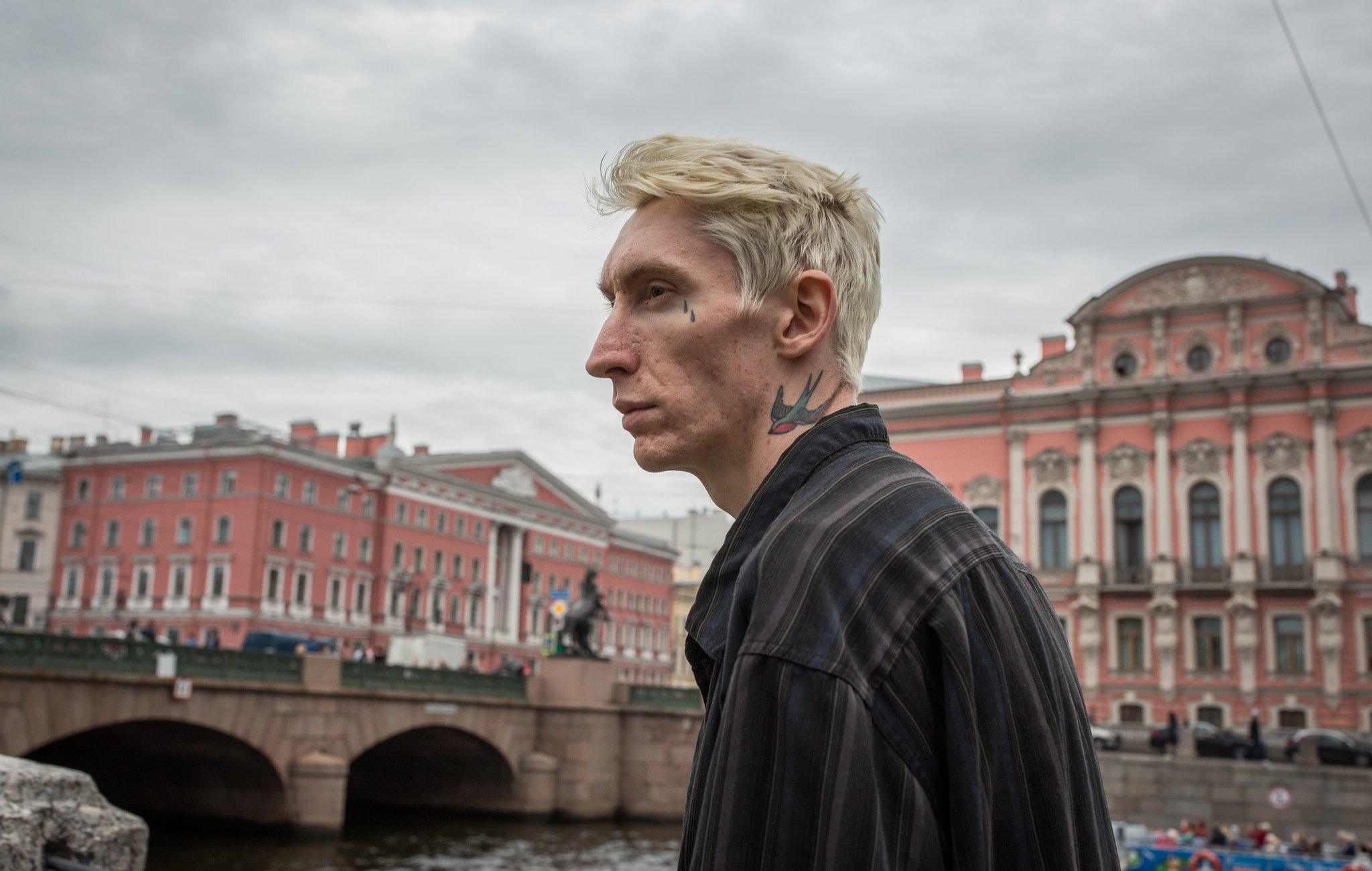
Kostya hopes that, eventually, society will change for the better
Kostya adds that veganism in St Petersburg is growing so rapidly, there was even an animal rights section at the city's May Day parade this year.
"We had more people than United Russia," he laughs, referring to President Putin's political party.
"The ideal Russia, and the ideal world, for me would see us living in harmony and equality, living alongside people where we are all different but we are all equal. Where there's direct democracy - where the people vote for or against policies directly through referendums, rather than through representative governments. And of course where we're all environmentally aware," he says.
"A world with no state, no police, no borders, no nations - where people can decide for themselves what they want and what they want to achieve."
Photographs taken by Svetlana Ivanova
You may also be interested in:
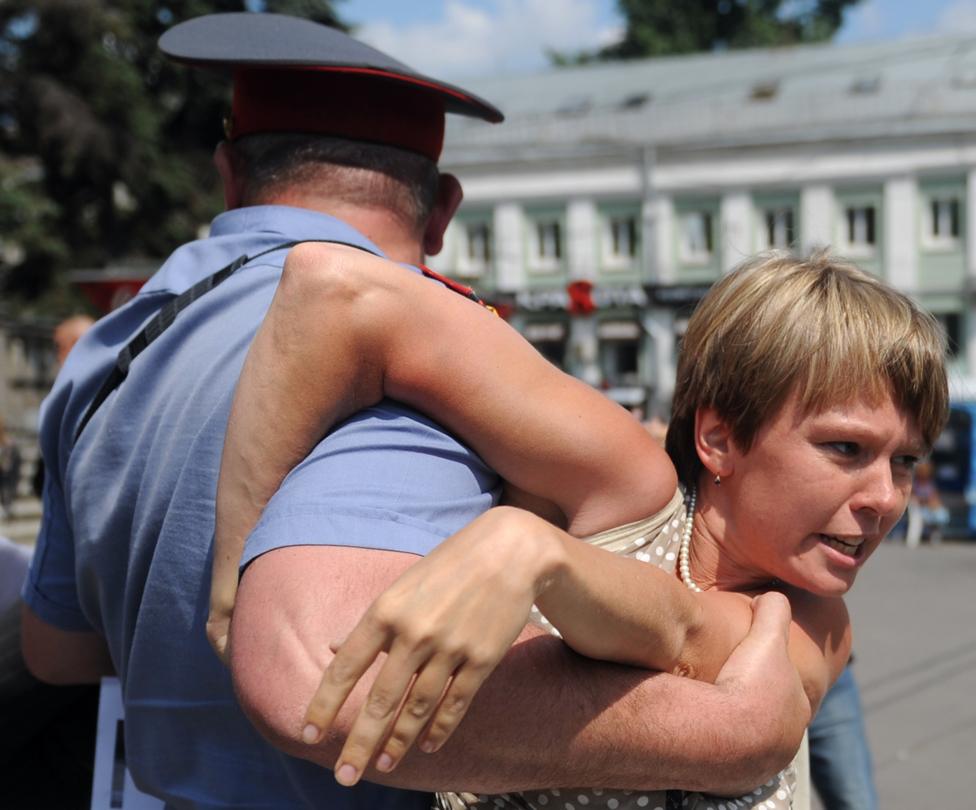
Russia's leading environmental activist is one of more than a million people - many of them young and well-educated - who have packed their bags and left the country in recent years, writes the BBC's Lucy Ash. Russian even has a word for the phenomenon, poravalism.
- Published27 September 2019
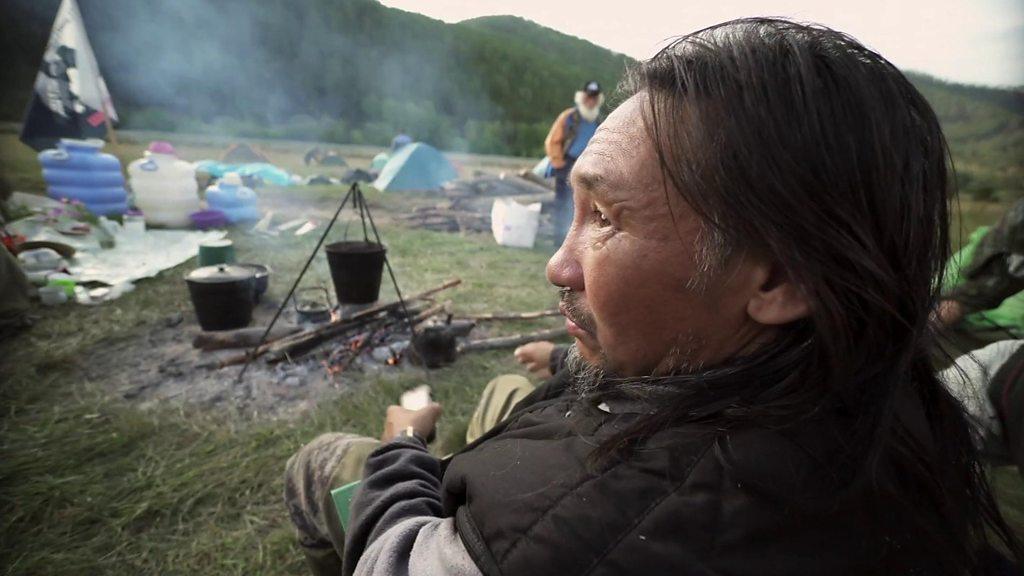
- Published13 August 2019
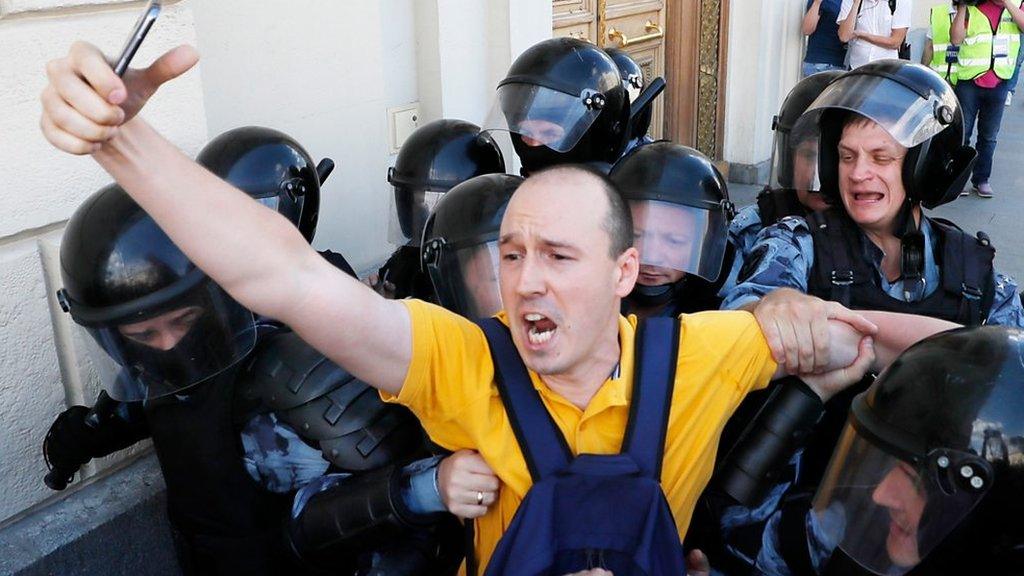
- Published7 August 2019
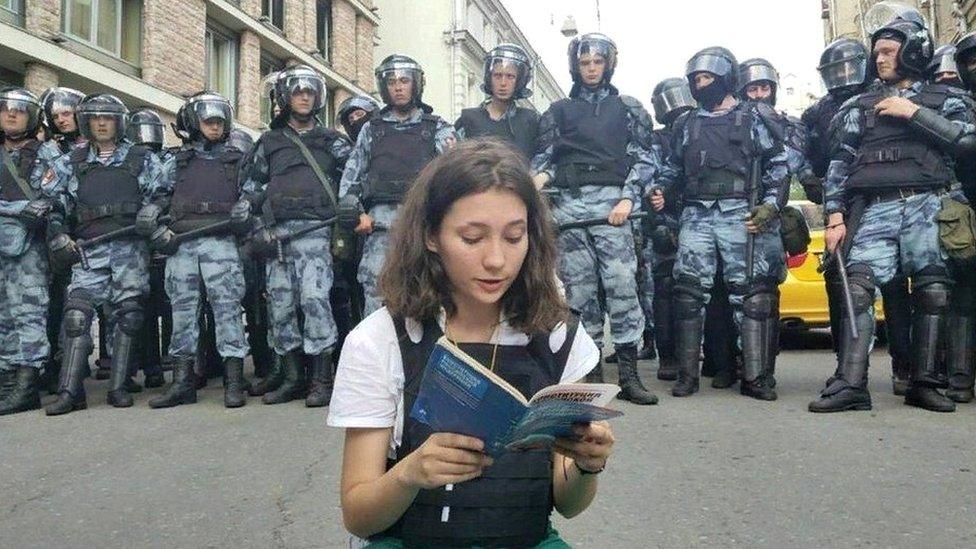
- Published1 August 2017

- Published25 August 2016
